#and his female perversions era
Explore tagged Tumblr posts
Text
love that tiktok has already suspended my account
anyway shameless self-promo: READ THE BOOK THAT GOT MY ACCOUNT SUSPENDED AFTER A WEEK (TEACHER'S PET by KANDI WILDE on Kindle!!)
#they just can't handle the ~SPICE~#teacher's pet#student x teacher#kindle#kandi wilde#kandi wilde author#young clancy brown is the faceclaim btw#specifically his earth2 era#and his female perversions era#akimi.txt#akimi 4444
4 notes
·
View notes
Text
"Priestess of Isis", "Enchantress" and "Sylph": Occult References in Ellen Hutter’s character in “Nosferatu” (2024)
In another post I analyzed Ellen Hutter’s character in the 2024 adaptation of “Nosferatu” through literary lenses of the Gothic female genre. Now, I want to dwell on her occult and mystical symbolism, and how this translates in her connection with Count Orlok, the undead demon of the story, who’s bound to her. But how and why? And what exactly is she in this story?
“In heathen times you might have been a great priestess of Isis.”
Von Franz tells this to Ellen in their last scene together, because he recognizes her spiritual power and ability to communicate with the spiritual world. Her “hysterical fits” and “epilepsies” also mirror the trance-like states of Pagan priestesses. She inhabits the “borderland”, a peripheral area, a portal between the two worlds: the physical (matter) and the spiritual.

“The pupil is expanded. It does not contract naturally to the light. […] A second sight. She’s no longer here. […] She communes now with another realm.”

“Somnambulists afflicted with these perversions [hysterics and lunatics] oft possess a gift: a sight into the borderland. […] I believe she has always been highly conductive to cosmic forces, uniquely so.”
Von Franz says demons usually obsess over “those whose lower animal functions dominate”, because they like them and seek them out. He elaborates: hysterics and lunatics. However, he says this before he actually gets to know Ellen, and he quickly realizes that’s not the case here. Because Ellen is the one who awoke Orlok from his centuries old sleep. Which is confirmed by three characters in the narrative: Orlok, Ellen herself and Von Franz.
O’er centuries, a loathsome beast I lay within the darkest pit… ‘til you did wake me, enchantress, and stirred me from my grave. You are my affliction.

Which leads me to the next topic:
Why Isis, of all deities?
Isis and Osiris
Isis is one of the major Egyptian deities. She’s more commonly known for her role as “Mother Goddess” of Horus, the Sun god. Isis had mighty magical powers, greater than that of all other gods, she governed the natural world, healing and wield power over Fate itself.
“Destiny!” Ellen cries out to Anna, while looking at the sea. “Providence!” Herr Knock screams throughout the narrative. “You run in vain! You cannot out-run your destiny!” Von Franz laughs in religious fervor as Thomas tries to save Ellen.
Isis is also connected with the themes of death, sex and rebirth in Egyptian cosmology, due to the myth of Isis and Osiris; which are also the core themes of Robert Eggers’ adaptation of “Dracula/Nosferatu”, so it’s not coincidental.
The “Osiris Myth” is one of the major surviving pieces of Egyptian mythology. It’s a ancient tale, with its early versions dating back to the 5th Dynasty (c. 24th century B.C.). It has known several adaptations throughout Egyptian history. The most complete version is in “The Moralia” by the 1st-century scholar Plutarch of Chaeronea, a collection of essays about Greco-Roman culture; that became very popular during the Renaissance era (14-16th centuries) and the Enlightenment period (18th century) in Europe.
Isis and Osiris were brothers, and according to Ancient Egyptian religion, they were in love with one another before they were born, and enjoyed each other in the dark before they came into the world. They eventually married.
Osiris had two facets as a God: in life, he was the God of fertility, agriculture, and vegetation, being considered a “Shepherd God”; in death, he was the God of the Underworld, the judge and Lord of Dead, the afterlife and resurrection. The pharaohs of Ancient Egypt were associated with Osiris in death, because as he rose from the dead, so would they unite with him and gain eternal life through imitative magic. Which appears to be the whole deal between Orlok and Herr Knock in “Nosferatu”, as Knock seeks to gain immortality like Orlok, by serving him.
On Earth, Osiris was believed to take on the form of a bull (the sacred bull Apis). What I find interesting here is that in both the 2016 script and the 2023 script of “Nosferatu”, Orlok’s physicality is actually compared to a bull:
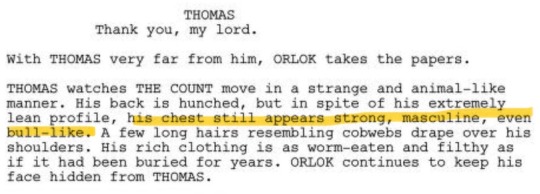

Osiris became king of Egypt, and taught the people how to farm and live peacefully in their villages; he had a reputation for being a powerful and wise king, loved and respected by the Egyptian people. We don’t know exactly how Eggers’ Orlok was in life, other than him being a Romanian or Hungarian nobleman and a Solomonar sorcerer who sought to achieve immortality. But if we go by Vlad III (Drakule or Dracula, the infamous “Vlad the Impaler”) biography, he’s actually considered a Romanian national hero because he defended the Romanian people from foreigner invaders (Germanics and Turks, mostly). Just throwing this out there, because it’s unsure if this is intentional or not.
Osiris and Isis had a brother, Seth (or Typhon in Plutarch essays), the God of deserts, storms, disorder and violence, who murdered Osiris to take his throne. He tricked Osiris into climbing into a wooden chest/coffin, shut the lid, sealed it shut, and threw it down the Nile River, knowing Osiris would never be able to survive. In some versions, it’s said Seth cut Osiris body into pieces and scattered them throughout Egypt. Interestingly enough, there’s a similar legend associated with Vlad the Impaler, who died in battle against the Ottomans, and, according to Leonardo Botta, the Milanese ambassador in Buda(pest), Vlad’s enemies cut his corpse into pieces, too. and his remains were never found.

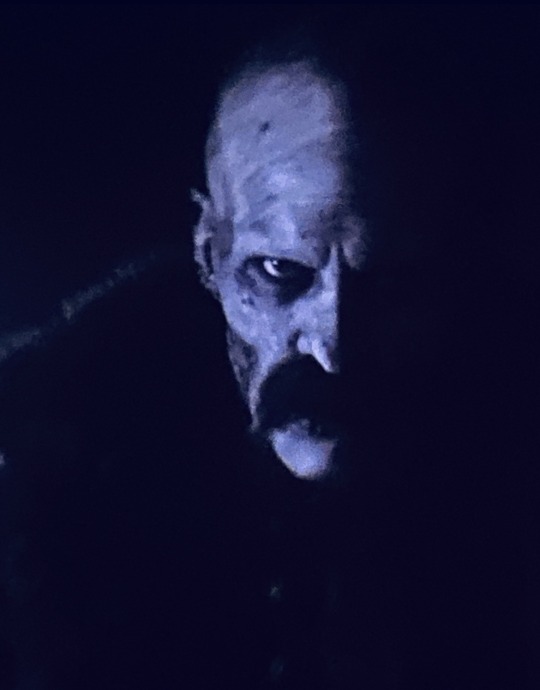
Isis is the epitome of the mourning widow in this myth, as she mourns Osiris’ death deeply. Here enters the symbolism of the lilacs in "Nosferatu", the symbolic flowers of Ellen and Orlok: in the Victorian era, they were associated with widows because they represented a memento of a deceased lover.
Can this also be a nod to “Bram Stoker’s Dracula” (1992) by Francis Ford Coppola? Where Dracula himself is the grieving widower because Elisabeta commits suicide? In the 1992 adaptation, Mina also speaks of “flowers of such frailty and beauty as to be found nowhere else”. What flowers is Mina talking about? It’s unclear, but Lilacs are native flowers to the Balkans, after all.
Isis sought for Osiris’ mangled body and with help of tree other Gods (Nepthys, Thoth and Anubis), they sew Osiris’ body back together, and then wrapped it head to toe in strips of linen, creating a mummy. Interestingly enough, Orlok’s corpse appears almost mummified at the end of the story.

In the Osiris myth, Isis uses powerful magic (incantations and magic spells) to bring her dead lover back to life; similar to Ellen who resurrects Orlok with her summoning prayer. In one version, this happened on a night of the full moon; in “Nosferatu” (2024) we also have a full moon connected to Ellen and Orlok, in the prologue, when he reveals his rotten corpse to her:
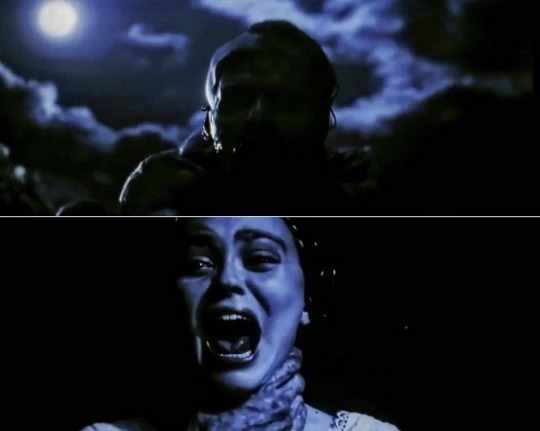
According to Ancient Egyptian funerary texts, it’s Isis sorrow, sexual desire and anger that empower her magic to be able to bring Osiris back to life. When Ellen prays for a companion of “any celestial sphere” in the prologue, she’s crying (sorrow), she’s upset because her father recoils from her now that’s she’s no longer a child (anger) and she’s in her teenage years/puberty (sexual desire). Like Isis with Osiris, it’s the combination of these emotions that power her magic to unconsciously resurrect Orlok.
However, Osiris can’t remain among the living, because he has to return to the Underworld and become King of the Afterlife. But before he goes, Osiris and Isis conceive Horus, the God of the sun and the sky, who will restore peace and order to the universe. In “Nosferatu” (2024), Von Franz says that “with Jove’s holy light” before dawn, redemption will come to the people of Wisburg and the curse of Nosferatu will be vanquished. “Jove” is Jupiter, the “King of the skies”, who’s connected with the Egyptian Horus. Horus and Ra are often merged together in Ancient Egyptian religion, making Isis and Osiris the metaphorical parents of the Sun.

In “Nosferatu” (2024), as Orlok and Ellen complete their covenant, consummate their wedding and he drinks from her, the sun is also the metaphorical result of their union. As dawn breaks, the sunlight vanquishes them both from the physical world, as they both die in the material realm.

After being buried by Isis, Osiris goes into the Underworld to rule over it. And from then on, Isis herself is also associated with funeral rites, as she would guide the souls of the dead, helping them entering the afterlife. Through her magic, Isis helped resurrecting the souls of the dead, as she did with Osiris, acting as a mother to the deceased, providing protection and nourishment.

At the end of "Nosferatu" (2024) we see Ellen fulfilling her role as “priestess of Isis” (or as Isis herself?), as the Goddess of healing, who ends the blood plague in Wisburg, but also guides her dead lover Orlok/Osiris with her into the Underworld... where he'll rule as king? Unclear.
Since we are discussing the Egyptian Gods, I have to mention Greta the Cat, Ellen’s domestic cat. Her name is an obvious homage to Greta Schröder, the actress who played Ellen Hutter in the original 1922 “Nosferatu”. Indeed, cats are predators to rats, however, the Egyptian Goddess Bastet is considered to be Isis’ daughter. She's the "cat goddess" for cats were considered sacred in Ancient Egypt. Bastet was associated with sun gods like Horus and Ra. Bastet was the goddess of pregnancy, childbirh, and protection against contagious diseases and evil spirits.
Enchantress
Orlok calls Ellen “enchantress”, but what does this mean? “Enchantress” is not only a female archetype, but has root in historical realities. Enchantresses were practitioners of feminine magic: oracles, healers, herbalists, midwives and shamanic shapeshifters. They were what’s commonly known as “witches”. These female magicians studied and practiced their art in goddess temples, mystery schools, alchemy schools and hedge schools.
The alchemists of the Middle-ages studied these dynastic lineages of “wise women”, and they had several names: enchantresses, chantresses, encantrices, or incantrix. Many physicians who founded "medicine" and "science" studied these wise women, mainly healers and their use of medicinal plants and herbs.
Ellen’s character appears to fit that of a “incantrix”. Women who used words, incantations, songs, spells and prayers to shape reality. It’s the priestess of an old religion (as Von Franz also calls her); gifted with magic power and authority to command the elements or the body by the power of their word.

Heptagrams
Orlok seal (or sigil) meaning has already been widely discussed by others (symbols of Ancient Dacian religion, mainly the figure of Zalmoxis), but what I want to mention here is the heptagram itself, the seven-pointed star. Heptagrams have several occult meanings, including warding off evil which, for obvious reasons, doesn’t fit Orlok’s character. It has meaning in Alchemy, too, as representative of the seven planets and seven substances.
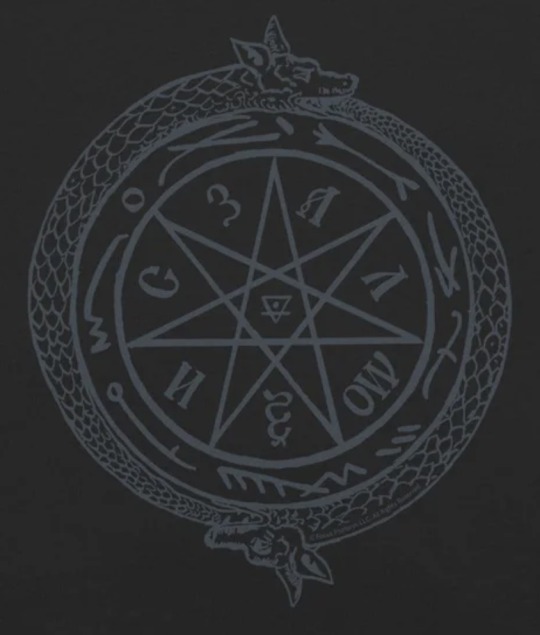
The heptagram, however, is used by Aleister Crowley in his occult system Thelema (from Ancient Egyptian text) to represent a goddess/archetype: Babalon, which is also connected with Isis, Nuit, Lilith, Kali, among other goddesses and deities. At its core, it’s a goddess of female empowerment and liberation, of divine feminine. According to this occult belief, Babalon has several manifestations (sort of incarnation) and is a spiritual gateway to wisdom and enlightenment through chaos and female sexuality.
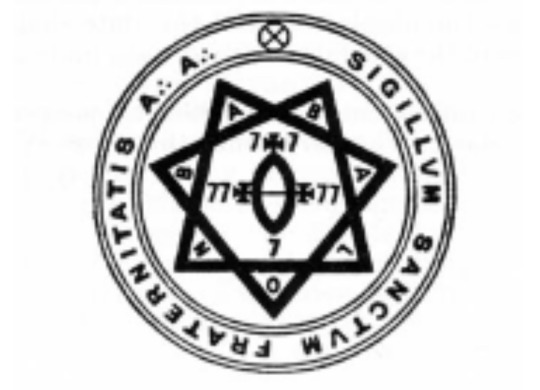
In “Nosferatu” (2024), when Ellen and Thomas are returning home, there’s a man in the streets rambling bits from the “Book of Revelations” (Apocalipse) from the Bible: “And I saw a beast rising out of the sea, owith ten horns and seven heads, with ten diadems on its horns and blasphemous names on its heads.” (Revelations, 13:1).
Indeed this passage is about Orlok arrival and how he’ll spread plague among the town. However, we have a character in the “Book of Revelations” which is connected to all of this: the Whore of Babylon, the “Mother of Prostitutes and All Abominations of the Earth”, and she rides this Beast, which is the same as Crowley’s Babalon. What Crowley did was a positive reinterpretation of this biblical figure, symbolizing liberated female sexuality by embracing the powers of the Divine Harlot.
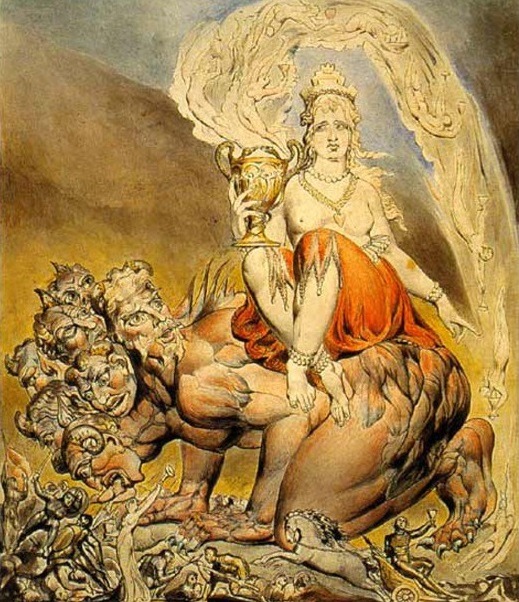
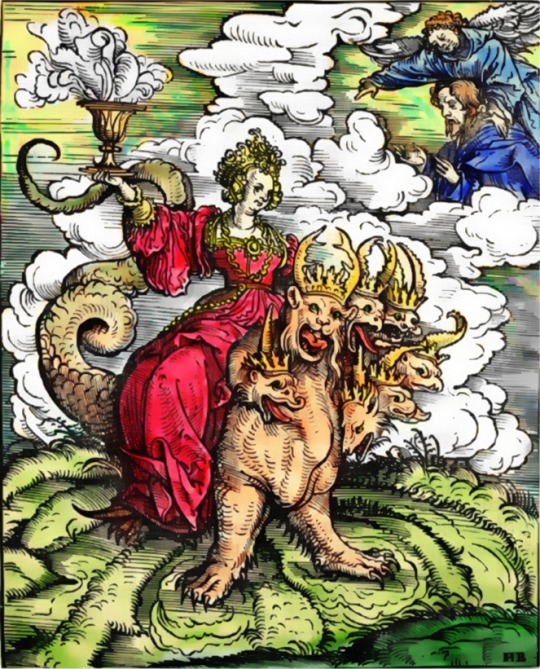
Also known as the “Scarlet Woman” and “Great Mother”, this complex and mysterious figure was established in 1904 in “The Book of Law”, however her roots are far older, and can be found in the Enochian tradition, a magical system by John Dee and Edward Kelly, dated from the late 16th century. In the 2016 script of “Nosferatu”, Orlok spoke Enochian, so it’s clear Robert Eggers is very much aware of all of this.
Initiatrix, Creator and Destroyer, Babalon is the “Great Mother” because she represents matter, Mother Earth. Like Isis, she’s the Archetypical Mother, the Womb, the Great Sea and the Divine Blood itself. According to Crowley, the “whore/harlot” facet is about enjoying sex without the burden of reproduction; and the “mother of abominations” connects with destruction like natural catastrophes, plagues, etc. She’s the ruler of the cosmological sphere and both good and evil (as evil as elemental forces can be or are considered as).
Crowley is a man who was born and raised in the Victorian era where sexuality was to be silenced and repressed, which provides context to his occultist beliefs and his “sex magick” theories. Victorian physicians and scientists were obsessed with classification of sexual perversions, too. “Hysteria” being one example among many. Which is the historical context for Eggers adaptation of “Nosferatu”/“Dracula”, so these references are quite fitting.
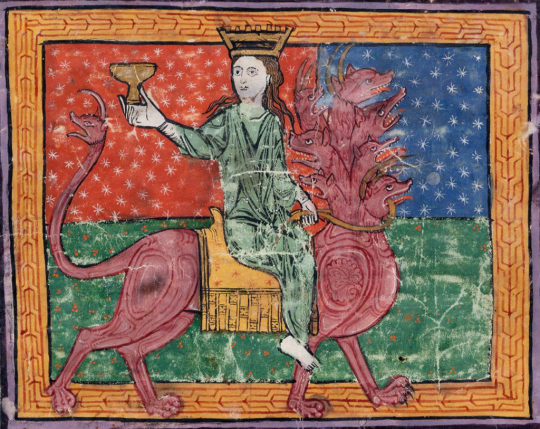
According to the Thelema, Babalon is the “Sacred Whore”, and her primary symbol is the Chalice or Graal (symbolic womb). She’s a consort to the Beast, who has seven heads, which is symbolically represented in her heptagram sigil. Crowley described her: “She rides astride the Beast; in her left hand she holds the reins, representing the passion which unites them. In her right she holds aloft the cup, the Holy Grail aflame with love and death. In this cup are mingled the elements of the sacrament of the Aeon”.
To Crowley these were not actual beings but titles/archetypes (sort of speak) in his Sex Magick beliefs: the “Scarlet Woman” is the High Priestess, and the “Beast” is the Hierophant. This fits Ellen (the priestess) and Orlok (warlock, black sorcerer) in “Nosferatu” (2024). The “Scarlet Woman” is a gateway to both the moon and the sun, and we see both associated with Ellen.
Orlok is described as a “beast” several times in the film, including by himself and by Von Franz, who also mentions Ellen’s “dark bond with beast”, and how she gave her love to the beast: "and lo the maiden fair did offer up her love unto the beast, in close embrace until the first cock crow, her willing sacrifice thus broke the curse and freed them from the plague of Nosferatu."
Orlok says Ellen’s passion is bound to him, like Babalon’s passion is united with the Beast. Babalon as “mother of abominations” also fits with how Ellen unleashed Orlok and his blood plague onto the world, bringing destruction and apocalypse.
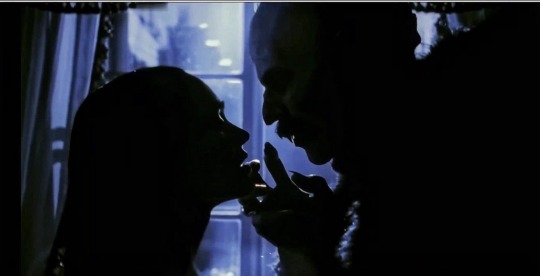
Your passion is bound to me. […] I cannot be sated without you. […] Remember how once we were? A moment. Remember?
Thelemic followers of the Beast have been trying to call into being an older, more primeval, female force that is lacking in the Modern Age. Interestingly enough, this was the reason why Orlok became interested in Ellen in the 2016 script (which was later changed, because in the 2023 version it’s Ellen who summons Orlok): “I have sought a creature from the depths. A Eve that remembers her Eden. You are such one.” Both Crowley but more notoriously Jack Parsons have tried a bunch of incantations to conjure Babalon into being.
Oddly enough, the conjuring ritual we see Herr Knock performing at the beginning of “Nosferatu” (2024) is very similar to one of the incantations of Babalon performed by Jack Parsons: Air dagger, blood and channeling of windstorms and the Air element, over a heptagram. He also compares Ellen to a sylph; a nymph of the air element from alchemy and hermetic literature. We are told by Von Franz this is Solomonari sorcery, but is it really?

In Ophidian Thelema, Babalon is the Goddess of magick (“Heka”), of the Liberation of the Spirit (ecstasy), of the Liminal Point, of the Underworld, of Vengeance and of the Principles of Life. Their priestesses use the female body (vulva and womb) to channel their power during their magic rituals. This is similar to Ellen’s “hysterical fits” when she’s communicating with Orlok in the spiritual world, especially since “hysteria” was considered a disease caused by “wandering womb”. In the film, we also see Ellen's womb being talked about between Von Franz and Dr. Sievers during her examination, when they say her menstruation is liberal and she has too much blood in her.

The “liberation of spirit” is in the form of a Serpent, which manifests in the flesh. This notion was present in the “Book of Law”, where its said there’s the dove, and there’s the serpent, and a choice must be made. While the dove represents religion, the serpent represents the spirit. In one scene, Ellen says Orlok is like a serpent in her body; and he replies it’s not him, but her own nature, a nature she denies. Babalon says “my vocation is the serpent.”
The priestesses of Babalon are also in control of their “trances” when they access the spiritual world. In “Nosferatu” (2024) there’s a interesting scene between Ellen and Thomas (the infamous sex scene), when Ellen “comes back” from her transe when he says he’ll call for Dr. Sievers. Does this indicate Ellen is actually in control of her trance-like states?
Babalon is the guardian of the Seven Principles of the Underworld, a place of darkness and transformation. Orlok tells Ellen in the prologue “you are not for the living. You are not for human kind.” Babalon is also the goddess of the liminal point, who can access other realms. As Goddess of vengeance, Babalon punishes when life is out of balance, and exerts violence and corruption upon those who are in the wrong. Ellen unleashes Orlok onto the world, and we can interpret him bringing plague into Wisburg as Ellen’s reckoning against a society that ostracizes her and will never accept her.

All rites and initiations of the Underworld Goddesses include rites of sex and death. Which is what we see with Ellen at the end of “Nosferatu” (2024). By Thelemic occult tradition, she, the manifestation of Babalon, has sex with the Beast (Orlok), “representing the passion which unites them” and her womb (Holy Grail; cup) is “aflame with love and death” (sexual climax, orgasm, with an un-dead vampire).
I will work the work of wickedness; I will kill my heart; I will be loud and adulterous; I will be covered with jewels and rich garments; I will be shameless before all men; I will, for token thereof, will freely prostitute my body to the lusts of each and every living creature that shall desire it; I claim the Mystery of Mysteries, BABALON the Great, and the Number 156, and the robe of the Woman of Whoredomes and the Cup of Abomination. “The Great Beast: The Life of Aleister Crowley”, John Symonds, 2016

Orlok being the Beast and Ellen the manifestation of Babalon explains why she’s promise to him in the narrative, and was never meant to marry Thomas: in Thelemic tradition, the Beast is the consort of Babalon, after all. Orlok's interest in Ellen isn't predatory for its own sake; he sees her as his rightful and fated spiritual consort, which fits the "bride of Dracula" theme of the Bram Stoker original story.
This probably also mirrors the 1992 adaptation by Francis Ford Coppola, where Van Helsing calls Lucy the “Devil’s concubine”: "Hear me out, young man. Lucy is not a random victim attacked by mere accident. Do you understand? No. She is a willing recruit, a breathless follower, a wanton follower. I dare say, a devoted disciple. She is the devil's concubine! Do you understand me? Yet, we may still save her precious soul." In this adaptation, Lucy is full Crowley and Parsons “Scarlett Woman”, with red garments and red hair.


Orlok also gives Ellen three nights to accept him/her nature and complete their covenant. Some are mistakenly associating this with Jesus Christ. These “three days” are possibly connected with another Goddess associated with Babalon: Inanna (or Ishtar), the ancient Mesopotamian Goddess of love, war, fertility, sensuality and divine law. The most famous myth about this deity is her descent into the Underworld, where she spends three days and three nights dead, until she re-ascends (rebirth).
Ellen also goes through the “Myth of Inanna” in “Nosferatu” (2024), which is the theme of the heroine descending into the “Underworld”, to suffer, to be stripped bare, to die, and to be reborn in the aftermath. This is the primal Shamanic crisis. Ellen also goes through three days and nights of suffering and death (witnessing her friends and the townsfolk of Wisburg dying by the blood plague) until she joins Orlok and is reborn.
Ellen and Orlok are involved in sex magick, at the end, clearly. But with what purpose? Sex magick to Crowley has several purposes and strong creative power, conjuring, invocation, etc. He believed deliberate acts of sexual transgression were a radical form of super-human power that promised to explode the narrow boundaries of Western Christian society and open the way for a whole new era of human history. Which is probably what’s happening here? A symbolic ending to the sexually repressed Victorian era as Western societies moved toward a more open-minded and accepting view of sexuality? Or it’s Ellen reborn as a Goddess of the Underworld (return to spiritual state), after going through a initiation rite of sex and death, as she breaks free from her human form? Or both?
Or it can be a nod to Crowley idea of sex magick to unleash supreme creative power to generate a godlike child? This can mirror the Osiris and Isis myth, of Horus (the Sun) as their metaphorical child, like it is for Ellen and Orlok here, as the end result of their union.
Alchemy
Alchemy, at its core, is the transmutation of base materials (lead, etc.) into noble materials (gold), and the pursuit of immortality (“philosopher’s stone”). Occultists reinterpreted this as a spiritual quest of self-transformation, purification and regeneration of the human soul. Hence physical death being seen as a gateway to another life (rebirth); which is the symbolism of the final scene of “Nosferatu” (2024).

Both Ellen and Orlok evolve from a diseased and corruptive state (physical world) into regenerative and perfect state (spiritual world), after being purified by fire (the Sun). Their old selves are empty shells, as their spirits ascend. This also finds parallel in the myth of Isis and Osiris, as they both went from “daemons” to Gods in the Plutarch essay.
And this also finds parallel in the 1992 adaptation when Vlad/Dracula ascends to the Heavens and is reunited with Elisabeta’s soul. Is this intentional? Are we dealing with reincarnation themes in Eggers' adaptation, as well? According to occultists both Babalon and the Beast have had many manifestations (reincarnations) in the physical world throughout the centuries, after all.

Orlok asking Ellen to remember their shared past, is also an interesting nod to Vlad and Mina in the Coppola's adaptation (their OST is called "Love Remembered"): "I have crossed oceans of time to find you." and “I have sought a creature from the depths. A Eve that remembers her Eden. You are such one.” in the 2016 "Nosferatu" script. Which didn't change all that much in 2023, except we don't have an actual explanation for Orlok interest in Ellen, other than her waking him from his centuries old sleep (resurrection).
#nosferatu 2024#robert eggers#ellen hutter#count orlok#lily rose depp#bill skargard#von franz#dr sievers#ellen x orlok#orlok x ellen
262 notes
·
View notes
Note
Hi there! I’m a huge DS9 fan, and I wanted to thank you and the other DS9 writers for how respectfully you portrayed Jadzia’s gender history. I understand from your previous answers that you weren’t necessarily thinking of her as trans (allegorically or otherwise) while writing her, but, considering the era you were working in, it’s really amazing to me how clearly and forcefully you chose not to go in a transphobic direction with her character. Like, she’s an attractive young woman who frequently and unashamedly tells people that (in her own words) she used to be a man, and she was in a TV show that began airing a year after The Crying Game came out; it’s very easy to imagine a version of the show where she is seen as (to use Julia Serano’s term) a deceiver and the object of either disgust or perverse fascination or both because of her change of sex. But instead, she’s allowed to be proud of her history and unashamed of her sexuality without either being seen as a threat to her womanhood. No one cares that she only came into a female body recently. She has nothing to hide or be ashamed of. She is loved for who she is. I’m a queer trans woman, and I mostly live in stealth (in the “I let people assume I’m a cis woman” sense) because of the discrimination and othering I’ve faced when I’ve come out to people in the past, which can be deeply isolating. At the risk of being embarrassingly sincere, Dax helps give me a vision of the future worth looking forward to. I truly can’t thank you enough <3
Thank you so much for sharing your story. It means a lot to me that Dax was helpful in your journey. Live long and prosper.

#ask me anything#tv writing#ask me stuff#ds9#star trek#star trek ds9#deep space nine#star trek deep space nine#deep space 9#star trek deep space 9#jadzia dax#dax
307 notes
·
View notes
Text
This Week in BL - We In A Slump, but help might be coming from a very strange source
Organized, in each category, with ones I'm enjoying most at the top.
Sept 2024 Week 4

Ongoing Series - Thai
Jack & Joker (Thai Mon IQIYI) ep 3 of 12 - I don’t have a lot to say except that the plot is somewhat predictable but the show is still very engaging. War is fantastic. I’m enjoying it a hell of a lot.
Monster Next Door (Thai Thurs Gaga ) ep 10 of 12 - The second leads are getting better in this one. I understand where they are coming from, which makes their conflict so much more understandably painful, and honest to a friends2lovers trope. The main couple is kinda standard college relationship drama, but they are cuties.
Kidnap (Fri YT) ep 4 of 12 - How is Ohm so damn gorgeous? Meanwhile, babies’ first argument. And it’s sponge bath time. Q has got to be wondering if Min is as meticulous with all kinds of care and attention to detail all......the......time. Somebody here in the hellhole said something about this being "the most BL to ever BL." And I think they’re right. At least right now. Although, watch out, we got us a new contender from the east.
I Saw You in My Dream (Weds Gaga) ep 11 of 12 - I do love the continuation of the perversion, in a good way, of the punishment trope from last week's episode. Oh, has the show finally remembered its title? NO SINGING.
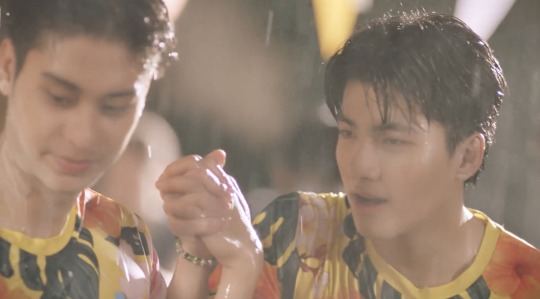
Addicted Heroin (Thai Tues WeTV) ep 7 of 10 - More kidnapping and an attack and now there’s a girl involved and somebody’s going to China and I don’t understand anything! And I don’t really care. Is this how the actual book originally went? Because it’s wild. Also TOO MANY of flashbacks. I guess they got a bit of a boyfriend era, and the claiming during the water fight was cute, but otherwise...... meh

Love Sick 2024 (Thai Sun iQIYI) ep 2 of 15 - One shouldn’t make comparisons, of course, but all I can think about is how amazing Captain was as Noh in the original series. Thus this show is mostly just making me want to rewatch the original. It’d be an interesting twist to have Aim be queer instead of a damaged cool girl slut. Was the helmet hand letting go a foreshadow of the iconic bookstore hands letting go? Also, I gotta say for the second episode of a series there are already too many flashbacks. Why are they using filler when they have so much content crammed into so few (comparable) episodes for a series? It’s annoying. Stop it.
Live in Love (Sun Gaga) ep 4 of 5 - This show has some interesting, if heavy handed, things to say about shipping and trolling, but also predatory/proprietary female behavior. It’s fascinating to see it tackled head on, if handled in a profoundly clumsy manner. I’m not sure how I feel about it. That said, most of this episode was actually an advertisement for a resort in Phuket.
Bad Guy My Boss (Thai Sun Gaga) ep 2 of 10 - I'm getting What's Wrong with Secretary Kim? vibes from this show. Only this is WAY more bullying. It’s very old-fashioned 90’s billionaire romance novel only gay. It’s never a good sign when I’m watching two boys kiss and I really want one of them to just bite the other ones lip off instead.
Battle of the Writers (Sun YT) ep 9 of 12 - No ep this week.
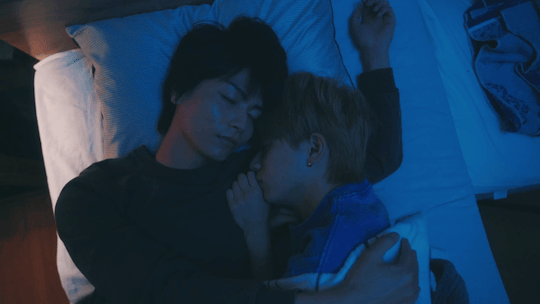
Ongoing Series - Not Thai
Sugar Dog Life (Japan Sun grey) ep 8 of 10 - Gosh it’s so frikin adorable. Baby got sick. He has SUCH A CRUSH. And such a courageous little confession! Yay! Can’t wait for next week.


Teenager Judge (Vietnam Sat YouTube) ep 1 - sure, yes this is, in fact, just Ba Vinh doing his thing with pretty boys again. And yet...... There is a REASON this leapt into the standings guns blazing. So it’s high school set but it's stepbrothers trope. (My, aren’t we popular this year?) I know, but I NEVER get tired of this trope. We got us Bach (BV's sullen tsundere) and Dat (babygirl meets bully). It’s GREAT how the brothers' dynamic is entirely different at school than when they're at home. My ear isn’t trained for Vietnamese, but I think Dat is using different pronouns depending on his location (his personality entirely shifts when he’s at school). I’m not sold on the Bach character, although I always trust BV to serve in the end (at least we know the kisses will be good), but Dat is utterly in love, a touch spicy, and reasonably complex. The surrounding cast is good too, my favorite pretty boy is there playing top dog (woof), and one of the besties is out gay (YAY!). The plot of the show is...... well...... absent. Nothing happened. But if we are aiming for Love Sick slice of life style BL, I'm game. Subs are appropriately terrible and confusing. But I like it A FUCK TON so far, so I’m gonna keep it in rotation. Nice to have Vietnam back in play. What a shocker.
2024 has been a year of upsets.
Love is Like a Poison AKA Doku Koi: Doku mo Sugireba Koi to Naru (Japan Tues Netflix?) 3 of 10 eps - I weirdly enjoyed the farcical music and the utter absurdity of the court case. I also liked how it highlighted what a good team these two are. Frankly I don’t mind a bit of an antihero sleazy lawyer + conman, it's engaging. I’m getting wholesome out of Thailand. I don’t really need it from Japan at the moment. Also I don’t believe for one second our conman actually is serious about the relationship. Conmen gonna con. I'm reminded of the scorpion and the frog fable.
First Note Of Love (Taiwan Mon Gaga) ep 8 of 12 - I love Orca so much. I do not love the autotuned version of Orca, but I knew what I was in for with this particular show, it's in the title after all. I did laugh a whole lot when Laing used kha. Hon, I don't think that word means what you think it means......
The On1y One (Taiwan Thurs Gaga) eps 11-12fin - I never thought I’d say this, but the pacing was off in the penultimate episode. Taiwan, and its chronic misuse of flashbacks strikes again. That said we eventually got a "lock in" trope and Wang being the biggest little flirt shit in the cafe OMG!!! Of course, you shouldn’t use a girl to torment your bf, but it was so well done, I can’t really complain. Meanwhile, teacher kisses. And now I understand exactly why they’re present in this narrative. Clever. Bummer of a burden on that ending though. I cannot see how they’ll manage to stick this landing. [That was ep 11]
AND NOW EP 12 - doomey doomey doom
Not the water bottle trope! Argh the teenage lust of it all. Just stop it. Wang is so smart he knows exactly how bad he has to be to leave the class. And his bf certainly knows that too. And......
......
So that was not an ending and I’m not happy about it and no one is surprised. Even I’m not surprised. I’m just disappointed. Even tho I suspected this was where we were headed I'm disappointed. That’s it. That’s all I got. How do I review something that was such a crushing let down?
Conclusion:
Based on a Mou Mou novel + the Your Name Engraved Herein team, this is old-school coming of age BL and it was bloody fantastic. Tsundere seme to beat all tsundere (smartest + tallest + bestest at everything but people) meets socially-ept cutie smart-ass uke. They're living together by end of ep 1 and start kissing by end of ep 2. A stellar tense slow burn stepbrothers trope that ate my life and than just belly-flopped the finale. What I'm left with is epic levels of disappointment and well...... at least nobody died? My standard "fatally flawed" rating for any BL is 4/10 so I guess that’s what I’m giving it.
Before you ask me for the stats: Taiwan does not have a history of second seasons. I went ahead and ran the numbers and the odds are certainly not in our favor. I put the chances at 2%.
Yes, I contemplated a revenge rating of 2/10 but even I'm not that mean.
It's airing but...
The Hidden Moon (Sat WeTV) ep 1 of 10 - This is a supernatural romance (my ghost boyfriend trope) by Violet Rain (I Feel You Linger). A man is hired to write an article about an old mansion in Chiang Mai being converted into a café. He sees the ghosts of people who died at the mansion, falls in love with one of them. Was substantially recast. I loved IFYLITA except the ending so I think I'll let this one run it's course you can tell me if it's work tracking down... if they managed to land it. I have my doubts.
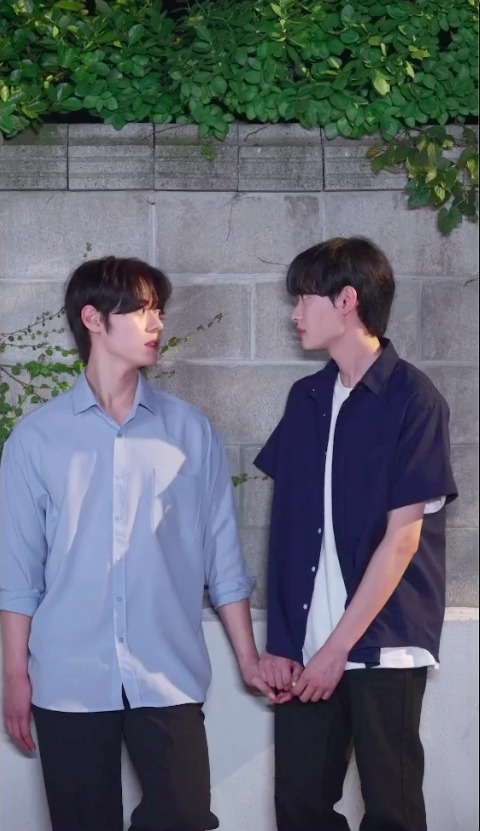
In Case You Missed It
Falling For My Boss is vertical format (nash) short from Korean BL about a happy-go-unlucky man who keeps losing his flower shop business because of romantically misbehaving employees (apparently it's a thing). When his best employee brings in a new boy he's worried she's falling for him, but it turns out it's his own heart on the line. He a clueless softy and The Boy is a lost broken sweetheart, making this a gentle little snippet of a show. There's a baby linguistic negotiation, some hung slinging, awkward handholds, and everyone is very pretty. For me the absence of kisses and the vertical format were more annoying than the length, which felt fine but many viewers will find too short. I enjoyed the 30 minutes of cute. All of which makes this a solid 7/10 from me. It was originally only available on this one ap in very short form with ads so I wasn't gonna bother. Then some kind soul cut it together without ads and stuck it up for download. Say thank you.
Oddball recommendation next: This podcast episode touches on some stuff we see in Thai BL so I think it's worth listening to. Journalist Dominic Faulder on the Complex History Between Thailand & Myanmar
Happy of the End (Japan Gaga) - Completed its run. A boy is disowned for being gay, dumped by his boyfriend, and ends up in a dysfunctional co-dependant relationship with his would-be kidnapper. We were due for another messy JBL and it's exactly as expected. I do not like it at all and DNFed. Gossip round the hellhole is that was a solid decision.
Marriage Equality Law has officially been enacted in Thailand...
Yes the actual law. Goes into effect Jan 22, 2025
Next Week Looks Like This:

Upcoming BLs for 2024 are listed here. This list is not kept updated, so please leave a comment if you know something new or RP with additions.
Coming Oct 2024:
10/3 Fourever You (Thai iQIYI?) 16 eps - New directs Earth (UWMA, 12%) + Pond (Century of Love, 180 Degrees), Bas (Gen Y, 2 Moons) + Maxky (Why You… Y Me?) and other familiar faces like Bever. Sampler pack university BL from Wabi Sabi that looks like it's trying to be a gay Boys Over Flowers (4 older med students hot boys) and I'm not mad about it. Trailer Not sure who's distributing this but my guess is iQIYI since they had the last few from this house.
10/7 Every You Every Me (Thai Gaga) 10 eps - Jade and Chin have lived over a thousand lifetimes. In each one they somehow manage to fall in love with each other. (This pair, TopMick was piloted in a My Universe ep, that was one of the only ones I liked.)
10/10 Eccentric Romance (Korea ????) 12 eps - Silkwood’s 2nd Thai/Korean colab, that has been in production since 2022 which is a LONG time in the BL world. I'm worried but I like the concept: friends of 10 years who’ve been hiding feelings for each other enter the same university. Plus MURDER.
10/10 Gangster and His Boyfriend (Korea ????) 8 eps? - Kim Dong Bin (famous trainee & idol reality competitor, yeah that happens) stars as a fallen idol who unexpectedly becomes entangled in a gangster family. Discovers that his friend’s father is responsible for the murder of his entire family years ago. I don't know much about this one, neither does anyone else and I'm not sure where I got that release date so……
10/21 Love in the Big City (Korea ????) 8 eps - Adaptation of Booker-nominated famous coming of age novel of the same title by Park Sang-Young. Cynical yet fun loving student writer Young pinballs from home, to class, to Tinder matches. He and Jaehee, his female besie and roommate, frequent nearby bars where they push away their worries about life, love, and money with soju. As time passes Jaehee settles down and leaves Young to face his problems on his own. Young finding comfort in the arms of the series of men, including one whose handsomeness is matched by his coldness and another who might be the great love of his life. Not really BL. Stars Kim Go-eun (The King: Eternal Monarch), Noh Sang-hyun, and Nam Yoon Su (The King’s Affection). This already released as a movie and isn't very well regarded, this date is supposedly an international release as a series. I'm wary of it being BL.
THIS WEEK’S BEST MOMENTS
I got nothing, The On1y One drove me into a funk.
(Last week)
Streaming services are listed by how I (usually) watch, which is with a USA based IP, and often offset by a day because time zones are a pain.
The tag BLigade: @doorajar @solitaryandwandering @my-rose-tinted-glasses @babymbbatinygirl @babymbbatinygirl @isisanna-blog @mmastertheone @pickletrip @aliceisathome @urikawa-miyuki @tokillamonger @sunflower-positiiivity @rocketturtle4 @blglplus @anythinggoesintheshire @everlightly @renafire @mestizashinrin @bl-bam-beyond @small-dark-and-delicious @saezurumurmurs
Sigh, Tumblr in its infinite wisdom doesn't like too many at-ings.
#this week in BL#BL updates#Jack & Joker#Jack and Joker#Addicted Heroin#Battle of the Writers#Monster Next Door#Sugar Dog Life#I Saw You in My Dream#The On1y One#First Note of Love#Live in Love#Kidnap the series#Love Sick 2024#Bad Guy My Boss#upcoming BL#BL news#BL reviews#BL gossip#Thai BL#Japanese BL#live action yaoi#Koren BL#BL starting soon#BL coming soon#new BL#The Only One Review#Teenage Judge#Vietnamese BL#Falling For My Boss
139 notes
·
View notes
Text
My Lovely Detective VII
PAIRING: Patrick Bateman x Fem!Detective!OC
CO-WRITER: @iron-flavored-lipgloss
CONTAINS: NSFW, master/pet dynamics, dirty talk, implied BDSM, pet names, brat taming, humiliation and maybe something else :D
WORDS: 2.2k
A/N: Hello everyone! Please forgive us for the long wait, we have been quite busy lately. Enjoy the new chapter!
LINKS: [MASTERLIST]; [SERIES MASTERLIST]; [AO3].


In My Twisted Era
Buying clothes for Andrea had become one of the few and all the more unexpected pleasures in Patrick Bateman's life. With Evelyn it had been absolutely horrible (she had her very own taste), and not even Courtney would have agreed to wear such skimpy, if not downright whorish clothes. But Andrea couldn't really refuse, she just had to show whatever sexy little excuse of an outfit Patrick was currently in love with. And for tonight's special occasion, there was no other woman he would rather have on a leash.
"I told you, this is no ordinary party. This is the dress code, and you will not bring your prudish sense of style into it."
The woman was wearing a very expensive set of lingerie, which he had deliberately made a little too tight to make her tits look even fuller, showing off every curve in a way that would surely make any other man jealous. The heels were also painfully impractical, probably the highest shoes Andrea had ever owned, and against her will it made her cling even tighter to Patrick's arm, needing stability.
All he had to do was tug on the sturdy little leash attached to her choker and Andrea would stumble right into his arms or fall to her knees—another idea that drove Bateman a little crazy, so he tried not to think about it right now. Patrick himself, of course, was dressed very differently, showing off his finest tuxedo, but pretending that there was nothing humiliating about Andrea being almost naked under her new big fur coat—that coat she was now forced to take off in the checkroom.
"It's very warm inside. Real candlelight," one of the ladies in charge explained emphatically to Andrea and then winked playfully at Patrick. Andrea, who in her blushing anger only looked delightfully innocent to these professionals, who had never experienced the perversions of an elite motto party like this. "One more thing—we have to check for any weapons."
That was ridiculous, of course—where would Andrea hide a weapon? Under her elegant Colombina mask? No, this was one of the few rules tonight to ensure everyone's privacy. But everything else was a part of the game, like the female cloakroom attendant groping Andrea. She squeezed her tits a little and pulled her lace thong down, as if to check if she had a gun shoved up her pussy.
"Hush darling, let it happen," Bateman whispered in her ear, just loud enough for the other woman to buy their supposed relationship and notice the shiver running through Andrea's body as a pleasant side effect.
Annoyed, Andrea tried not to scoff and spat in the attendant's face as her hands resumed their shameless exploration of her body. "One more move and I'll break your fucking fingers," she hissed as the woman bent down to her neck, her lips almost touching the detective's throat. "Understand?"
Unaware of Andrea's words, Patrick leered as he enjoyed the scene unfolding before him. Oh, how often had he imagined himself having fun with Andrea and another woman. Tonight all his fantasies could come true, he would do anything for it.
The attendant suddenly backed away, almost bumping into Bateman, but he managed to step away at the last moment. Scowling, Andrea adjusted her lingerie, looking aggressive and very angry. 'If only I could rip these clothes off,' the woman thought, looking around to assess the situation. There were a lot of people, a lot of rich, depraved people who were definitely sick and immoral. Patrick's cheeky chuckle caught Andrea's attention again—the woman who had shamelessly groped her a moment ago was now busy inspecting Bateman, and judging by his reaction, the man was enjoying the process.
"Have a nice evening, Mister." The woman murmured before pecking Patrick's cheek and slipping something into his jacket pocket.
Frowning in disgust, Andrea wanted to use this as a chance to escape, but as she turned to see the exit, another couple walked in. A black haired man was holding a blonde girl on a leash who was crawling on all fours like a dog. This was already too much for Detective Moore, more than too much.
When Patrick had finished with the bitchy cloakroom lady, he grabbed Andrea's wrist and forced her to follow him further into the house. "I... I don't feel well," the brown-haired woman said as they moved through the noisy crowd of people, most of them already naked but still wearing their masks. "Can... Can I use the bathroom?"
'This party is the chance I've been waiting for,' the idea came to her faster than she could move, as she slipped through the groups of rich yuppies and their pocket whores. 'I should escape. Otherwise I won't make it tomorrow.'
"We've barely arrived," Patrick muttered, slightly annoyed, before he seemed to think of something—his mood changed again. "But I guess my poor girl was so nervous, she couldn't help it." He was playing that role again, the caring and generous lover—only the arrogance of his smile betrayed his true nature. "We'll look for a bathroom on the way."
One hand firmly on the leash, the other boldly wrapped around her waist, Andrea couldn't help but follow him deeper into what seemed to be a temple of hedonistic desire. The high, dark walls and even the ceiling were adorned with various framed nude paintings that would have been tasteful under any other circumstances, but here, in this place, they only added to the sinister atmosphere—along with those suspicious noises of unknown origin echoing through the hallways, a seemingly endless number of them branching off to the left and right of the main corridor.
Bizarre shadows dancing on the walls and the beguiling scent of musk and sandalwood followed Patrick and Andrea, as well as dozens of other couples. Some women balanced on their stilettos like Andrea, others crawled on the floor, it was hard not to step on their fingers.
And finally, a glamorous ballroom awaited them, with chandeliers hanging down, the lights dimmed naturally, and sensual jazz sounds played by a live band. There were several champagne towers and a buffet table so large it could have fed the entire homeless population of New York, yet girls in short maid dresses carried trays of drinks and snacks through the flow of muted conversation.
There seemed to be too much of everything, but "it's just the entrance hall," Patrick assured Andrea, smiling at the couple next to him, exchanging brief nods with the other man and thus showing respect for each other.
"First time here?"
"It is, for her."
Patrick squeezed Andrea's shoulder, but his gaze remained on the young woman lounging on the floor, caressing her male companion's leg and looking up at him with large, dilated pupils.
"You like her?" The broad grin that appeared beneath the stranger's mask suggested that he was not annoyed by the attention his girl was receiving—quite the opposite.
"Well, I can't lie ... she seems very well-behaved."
'And she's very blonde and busty, too. Although Andrea's tits look even better.'
"Yeah, you're a good little kitty, aren't you, Jessica?"
Patrick watched the woman, apparently Jessica, in utter fascination as she rubbed her cheek on this guy's shoes and told him, "Yes, Master."
It was a very strange mixture of affection and obedience—basically the opposite of Andrea.
"I assume you didn't come for the food. Although..." They cast an odd glance at another group of men lined up around a girl smeared with cream.
"Not exactly. Andrea's not quite there yet."
As they left this hall of the gluttonous, Jessica simply followed, but when it came to Andrea, Patrick had to pull hard on her leash first. Any protest died in her throat as Andrea had to gasp for air instead.
"A brat, huh? Charming little hot blood..."
"I don't share her with men." Patrick wasn't even sure how those words had come out so quickly and clearly - Evelyn having an affair had never bothered him.
'And it's not like I care about Andrea ethier!'
But the thought of this stranger (who was about as tall as he was and looked very fit to boot) fucking Andrea made him feel sick.
"Oh, not me. But my little Jessica likes to play with girls. So maybe..."
And of course that sounded much more appealing to Patrick.
Andrea swallowed hard, a shiver running down her spine at the thought of being involved with another woman. There was no way Bateman was considering it, but when he approached the bitch named Jessica and leaned down to stroke her cheek, something inside the detective tightened like a spring.
"Now, now," Patrick crooned as Jessica tried to kiss his hand. "You're a playful one, aren't you?"
The owner just chuckled, completely unbothered by the fact that another man was touching his girl, and it made Andrea almost vomit, but instead of making a scene, she decided to play along and get Bateman's attention back.
Quickly, the brunette stepped back so that the leash in Patrick's hand tightened, forcing him to look back at his pet. "Hey," Bateman barked in a threatening tone, pulling on the leash to bring Andrea closer until she was level with him. "Behave yourself," he pointed an index finger at her, knitting his perfectly sculpted eyebrows. "Otherwise you'll..."
Patrick froze, the words stuck in his throat like a lump as Andrea wrapped her plump lips around his finger and sucked on it with pure devotion. Another couple seemed hypnotized by the scene as the lewd aura of Bateman and his lovely detective consumed them like a fog.
"And I thought you wanted to play with me first," Andrea purred after releasing Patrick's finger. "We don't need anyone else."
"Is that so?" Bateman murmured back, his pupils dilating by the second as he watched Andrea nestle against his large palm. "Or are you just jealous?"
Patrick nuzzled the detective's neck and cupped her ass possessively, eliciting a soft moan from her lips. Andrea even forgot the couple next to them, the place they were now, she forgot everything. Just one bite was enough to bring down her defenses. That man, dear God, that man was a devil in the flesh. Disappointed and absolutely jealous, Jessica reached out to touch Bateman again, but her master wouldn't let her, tugging at the leash and forcing her to stay still. Andrea couldn't hide her pleasure at seeing this poor little bitch suffer, even though she felt terrible about having to act so damn lewd. 'I must have completely lost my mind.'
Satisfied and sated, Patrick pulled away from Andrea to turn and wink at Jessica, making sure the detective didn't see it. "It was a pleasure to meet you," Bateman nodded to the stranger and his submissive. "Have a good evening."
With that, Bateman tightened his grip on the leash and made Andrea follow him. It felt like the party was getting even more crowded, female moans, male groans and seductive giggles blending into a wicked cacophony of sounds; Andrea's head was spinning from the strong scent of the aroma candles.
"Where are we going?" Andrea asked suddenly as they turned another corner and walked down the dimly lit hallway. "Patrick?"
The man didn't answer, speeding up as if they were being chased. But by whom?
The woman could feel her heart pounding so painfully against her chest that it was hard to breathe, but when they reached their destination, Andrea felt weak in her knees. With a smug grin on his handsome face, Bateman opened the door, and the first thing Andrea saw were several large chains attached to the ceiling, holding what looked like a leather seat. Speechless, the woman took an uncertain step before Patrick placed his hand on the small of her back, urging her to get in. Once inside, a soft click of the door echoed through the small room with dark walls and intimate lighting.
God, what was this place?
"Is it... some kind of torture chamber?" Andrea asked, looking around in complete shock. "Why... Why are we here?"
It took Patrick only a little effort to push Andrea's body into the leather seat, the woman still too stunned by her new surroundings and his quick movements.
"You know, you could have told me earlier. That you want me all alone..." He leaned down, his left and right hands grasping at the attached chains, trapping Andrea close to him.
There seemed to be no escape from those eyes—hypnotic and so hungry, a dangerous desire radiating from each of his smooth movements. If just the look could kill. If eyes could devour...
Andrea couldn't help but shiver.
"You're sweating, dear." His thumb began to stroke her forehead, caressing her cheek in a light gesture that would seem so uncharacteristically tender if she didn't know him better. Beneath the surface of this controlled seduction, he is the same beast as always. "That feeling... you know the one. The one that makes your heart race and your fingers tremble, just like this." His hand now ran down her naked arm, rubbing circles of false comfort over her goosebumps.
Down to Andrea's wrist, that vulnerable spot where the veins shimmered purple through her skin and her artery pulsed rapidly under the dull pressure of his thumb. She was alive, and that made him feel alive in a way that no words could express.
"Is it fear or...? Are you so excited for me?"

P.S. Thank you for reading until the end! You can follow my side blog @makeyoumineagain and my amazing co-writer @iron-flavored-lipgloss and turn on notifications to know when we update!
#american psycho#patrick bateman x reader#patrick bateman imagine#patrick bateman#patrick bateman x female reader#patrick bateman x you#slasher x reader#slashers x reader#slasher x you#slasher smut#patrick bateman smut#patrick bateman headcanon#christian bale smut#christian bale x reader#patrick bateman reader#christian bale#patrick bateman imagines#oc x canon#patrick bateman x oc
69 notes
·
View notes
Note
Some of the discourse around Nosferatu is kinda wild
Nosferatu is a classic example of how people think that they need to shut down the arguments of anyone who disagrees with them about anything (versus just letting the arguments exist while disagreeing with them and engaging with them when you wish) and the best way to do that is by calling into question the morality of the person who disagrees with you. Because we've created an environment in which the best way to shut up your opponent is to call them a rape apologist, even when you're discussing the story of an 1800s gross vampire who's slinging his rotting dick around.
I personally think that pieces of media can be many things at once. I think Nosferatu absolutely tells the story of a woman who's been groomed and assaulted. I also think it's the story of a woman who desires the physical manifestation of death, emotionally and erotically. I do think you're supposed to interpret Ellen as wanting Nosferatu, and being repelled by him. I think she as a character can want Nosferatu and be in love with her husband. I think she can be in love with death and be in love with her husband. I think her husband can be a good dude who's in love with her and shuns parts of her that he finds repellent as a man of the nineteenth century.
I also think that this all aligns with a rather straightforward metaphor for the taboos surrounding sexuality, and female sexuality in particular. It doesn't matter if Ellen's desires are "natural" or "unnatural". They will be shunned and seen as perverse either way. She can not want to have them, and yet they're still there. And perhaps they would be there either way, but she's conditioned to see them as perverse and awful. None of this is literal, and it both works in a straightforward manner against the setting of nineteenth century Europe... and against our current era, in which the neopuritanical movement is in full force. We are going BACKWARDS, and as such the metaphor is apt on multiple levels.
And as an aside, I find it interesting that some of the same people I've been pearl clutch over the idea that people are fascinated by Ellen and Orlok's dynamic (because... the shipping is silly at times sure, but it's also a manifestation of simply being intrigued by something... it's not that deep) were just as into The Witch and the Black Philip of it all. "Wouldst thou like to live deliciously" is... kind of one to one with Orlok's seduction of Ellen, lol. Nosferatu just says the quiet part out loud. Or louder than The Witch, which was already pretty loud.
Additionally, Thomasin is a minor lured to the dark side by a seductive figure. We kind of all sort of went in on that metaphor and the combined destruction and freedom Thomasin found in "giving in" to Satan. You could certainly say that, throughout The Witch, we are watching Black Philip/Satan groom Thomasin.
I find it a bit weird that Nosferatu tells a similar tale almost a decade later and simply makes the seduction and grooming more explicit... and suddenly we're up in arms.
I don't think Eggers could have foreseen that reaction (though I imagine he considered it, if he's at all aware of Online People lol) but it does kind of make for an interesting, and disturbing, commentary on societal regression.
Also:
This is all fake and I wish people could just ... let fiction be fiction.
I say this as someone who used to try to trump people with MORALITY in my dumbass fandom arguments. I get it. It's tempting. Sometimes I find myself slipping into that again.
But it's an immature method of argument.
#the witch#nosferatu#and i'm not saying the witch and nosferatu don't have massive narrative departures#certainly thomasin's reasons for giving over to the devil are more individualistic than ellen's#buuuuut while ellen sacrificed herself i don't think that's ALL that was going on there
26 notes
·
View notes
Text
Poetry was born to break the bonds of prejudice. It came in the midst of an authoritarian era that preached modesty, but it has always been the most debauched in history. If they could write about everything that happened there, the story of Sodom and Gomorrah would be a children's story. It was an intense battle between dictatorship and freedom, at least of expression. Now, in the twenty-first century, one can no longer write about lust. Who has never read a book by Brazilian writers about adultery and seduction and yet they were adapted for television, without taking or adding an i? Sex is where love ends. There are many steps before that. I know that, but the peak is in bed, between man and woman, woman and woman, man and man. I did not mention animals, because then it becomes perversion. The greatest of all poets, William Shakespeare, could never see women playing his female characters in his great works until the prohibitions were broken. We live with our rights restricted by the government. Imagine having our thoughts and eyes blindfolded by any type of censorship. Great works come out the freedom to be able to imagine and put on paper everything that is possible to do and then write, a simple act of grabbing your hip, fitting in and going for it, makes our imagination believe that everything is possible to give pleasure, Nelson Rodrigues would be shocked by such an abuse of power, the power to satisfy the hunger to think, write or read, in a country where few lie down to read and not sleep, unfortunately we cannot prohibit any type of content, we will be killing those who love reading, a true poet or poetess, are always transgressors of humanity, someone who does not bow to any imposition, the most diverse Shakespearean women, Desdemona, Cordelia, Juliet, Helena, Isabella, Adriana, Catarina, Beatriz, Viola, Rosalinda, Lucrecia, Percia, Jéssica, Nerissa, Helena again, Gertrude, Imogenia, Hérnia and Ofélia, all loved and made love too much in the greatest books ever written, now imagine if no one could have read them, before banning, read Othello.
Jonas r Cezar
16 notes
·
View notes
Text
A writeup/outline of the House of the Dragon/Song of Ice and Fire fic I worked on feverishly for a month and a half:
Premise: So, over two-four months of binging HotD fanfic before abruptly focusing on something else, I found a lot of fics with one or more Game of Thrones-era characters being reborn into the Dance era, but very few in reverse — I can only remember one, and it overwrote a canon character who I like with a HotD character I don't care about so meh. (There were a handful more with HotD characters suddenly being transported to the GoT era, but most were abandoned.)
So, the other way around — why might such a thing happen?
Well — Jace owes the Starks a Targaryen princess. The Starks seem to have felt dying cleared the debt, but they aren't the only ones who might care about oaths sworn in godswoods. So, Jace gets to be reborn until he delivers. As a girl, because he doesn't have a right to promise other Targaryen princesses. —Except his brothers. Well, sisters.
Unfortunately the Old Gods do not have free access to Targaryens; they need there to be a backdoor, so not every generation is accessible. Also they are possibly using a somewhat perverse definition of "princess".
First backdoor: Melissa Blackwood, one of the mistresses of Aegon the Unworthy. Jace and Luke are reborn as Mya and Gwenys Rivers. (Melissa's third child is a boy, and also earmarked for other purposes, so Joff sits out this round.) Even after they're legitimized they're not precisely princesses; there's no reason the Starks would want to marry them. They end up pretty preoccupied with Targaryen stuff anyway, supporting Daeron II and opposing the Blackfyre Rebellion. They go through some bad stuff. There's a whole story here, between the Blackfyre Rebellion and the frankly insane dynamics of Aegon IV's court.
(Part of the story is about their little brother, Brynden Rivers, who loves them very much and also sees who they are after a greenseer-awakening sojourn on the Isle of Faces.)
Altogether it's not an entirely unsuccessful life, but delivering Targaryen princess: Not accomplished.
You might think that Betha Blackwood would be the next backdoor! You would be wrong. Possibly Shaera was un-meddleable due to upcoming Prince that was Promises bloodlines. Possibly the Old Gods are set on only reincarnating them as questionable princesses.
The next backdoor is Jenny. Duncan and Jenny weren't planning on having children, but whoopsie-daisy, twin girls. Jenny's friend (the future Ghost of High Heart, henceforth Woman of the Forest/WotF because I don't want to keep typing that) sees some things about the babies, but not very clearly, so they end up named Junia and Layne.
Junia and Layne have a good, sheltered childhood. (Junia could definitely have been a much better and more responsible princess than Shaera, but whatever.) They're in their mid-teens when Aegon V comes up with his dragon-hatching scheme. They are 1000% on board with this. They love dragons. Targaryens without dragons is just wrong. They die at Summerhall. But — and this will be important — the WotF understands their situation enough to know they will eventually be back.
If Lyanna Stark had daughters (who didn't already have Destinies), that would have been a suitable backdoor. But, she doesn't, and her son mustn't be tampered with. And of course not much later there's a serious Targaryen shortage.
If I were writing this properly I'd introduce Jessamyn, Lucinda, and Jocelyn Flint and leave the connection vague until later, but since I'm not — their mother Mona (short for Daemona) was a Blackfyre in the female line. Their father Ronnel is the backdoor, and a younger son of House Flint of Flint's Finger who ran off to become a sellsword in Essos.
(This is the most excruciating parentage by far, because after Mya and Gwenys's experiences they really, really hate Blackfyres.) (Joff is here for the first time, and Jess and Lucy won't let Jo out of sight, mostly.)
Ronnel says they're trueborn and no one in Westeros can contradict him, but technically their parents never formally married (no godswoods available).
Mona dies and Ronnel gets sick/takes an injury that won't heal/idk something where he's dying but not immediately. Mona didn't trust her family, so Ronnel takes the girls to the North. He'll trust his brother with his daughters' safety — but not with the several chests of Essosi gold Ronnel is leaving to them. Those Ronnel entrusts to Eddard Stark, the contents to be released to his daughters only; as a compromise, they can withdraw some before they marry to help offset expenses.
Thus they are not infrequent visitors to Winterfell, not close to the Starks but quite well acquainted. Which puts them closer to 'marrying a Stark' than they've ever been, but Catelyn is very clear that they are not suitable prospects. Jessamyn Flint is a responsible girl with enough dowry for a respectable smaller house to overlook questionable origins and some personal eccentricities, but shouldn't look higher.
Also Jess has a temper — better controlled than Jace's, because Mya faced severe consequences for lashing out and Junia's family actually taught her how to manage anger, but it's still there. When it shows up at Winterfell it's usually because Theon Greyjoy, comedic genius, has reacted to Lucy's somewhat boyish behavior by persistently nicknaming her Brave Lucy Flint. This is generally agreed to be reasonable grounds for even a lady to lose her shit. (If Jess had Jace's training and muscle mass it would be all over for him.)
Cascade effect from this: Because the Brave Danny Flint thing gets brought up over and over and OVER again, tied into reality in a way the song alone won't do, Jon is much less enthusiastic about the Night's Watch. In fact, he wants to go for a knighthood first (or instead) — when he leaves Winterfell he goes to House Locke, one of the handful of Northern houses that does knighthood. And when the North goes to war, Jon rides with House Locke to the Green Fork and gets captured.
After Robb is crowned, Jess has the idea of reaching out to her father's contacts in the Company of the Rose — would any of them want to come defend an independent North, at least enough to get a good price hiring them? She also volunteers her dowry to pay for it. So, Jess and one of her Flint cousins set out to get a ship to Essos, and Lucy (with Jo) is dispatched to Winterfell to get the gold if things work out.
The three-eyed raven gives Bran a very clear and explicit warning about Theon's party approaching, with instructions on how to avert it. The castle falling would be useful to drive his successor northwards, but Brynden is not about to let Gwenys get captured by Ironborn. The attack is foiled with minimal casualties, but Theon takes out one of Lucy's eyes. (Lucy has a hysterical laughing fit before passing out.)
—After this Theon is either dispatched for the Wall and does Night's Watch things or "escapes" with "Reek" and has a very bad time.
In the course of preparing for the attack Brynden revealed through Bran that he's still alive and can communicate through weirwoods. He has to be much less cryptic in explaining why Bran needs to cross the Wall. Lucy is unconvinced and says she certainly couldn't let Bran go without her, which Brynden doesn't like at all. Fortunately for Brynden's plans Lucy is still in recovery, and she is unable to stop Bran from slipping away with the Reeds, Hodor, and also Jo. Brynden will be in so much trouble when she tells Mya.
Jess has her own problems. The safe thing to do would be to head to Essos by way of White Harbor — but starting from Riverrun that's a long way out of the way. Sneaking through the Riverlands to Saltpans should be much faster. It's a terrible idea but Jess knows the Riverlands well (or did when she was Mya) and her cousin is short on common sense. They get caught and taken to Tywin at Harrenhal. We now have Jess, Jon, Arya, and Tywin all in Harrenhal.
Which is not quite the same as it is in canon, because — remember Jenny's friend knowing Jenny's daughters would be reborn someday?
The Woman of the Forest dug up those seven dragon eggs Aegon V brought to Summerhall and buried them by the Harrenhal heart tree. They'd already been in a pyre with way more than seven people, and Harrenhal has plenty more death to offer, so when magic starts growing again — say, about when the direwolf mother came south — they hatch. Now the Harrenhal godswood has seven possibly cursed dragons. (Almost definitely cursed, really. They're most active at night and stealthier than they should be even at night; they grew quickly to a fairly small size for dragons and then stopped; they are uncannily knowing for animals.)
Cursed or not they've been very considerate for dragons — they've never attacked inside the castle. They're practically friendly with the castle smallfolk who discovered and secretly fed them. (The smallfolk called them after the major houses of Harrenhal — Hoare, Qoherys, Harroway, Towers, Strong, Lothston, and Whent.) When they started attacking Lannister raiders they did it outside the castle.
Since Jon Snow has been a prisoner, one of them has been lurking around the relevant tower more.
When Jess arrives, one breaks into her cell within a few days. (Jon is an option. They're meant for Jess.) (The one that's most for her is Strong, because of course it is.)
There's a very exciting night after which they're in control of Harrenhal and Jess and Jon have claimed dragons, to Jon's consternation. (Two more of the dragons are destined for Lucy and Jo.)
Blah blah, more stuff happens, I'm not sure how the war works out exactly but Robb marries Jess after all because she's from a good northern family and HAS A DRAGON.
They still have quite a bit to do up North even before the Others show up because in addition to the Ironborn and potential Bolton problems—
No Jon Snow means Lord Mormont gets killed by a wight, which means that the Watch started attempting to elect a new Lord Commander and deadlocked. No Great Ranging. No infiltration of Mance Rayder's wildlings by Jon or anyone else. Wherever the wildling army attacks — maybe not Castle Black if it's full of election — they're a surprise, and any wall-climbing advance guard was un-infiltrated. Mance gets through.
(Which will actually be a benefit when the Others show! Going to take a while to work that out, though.)
The Bastard Dragons will likely help with all this. (Also Brynden has to be careful with Bran or his sisters will be disappointed.)
Anyway anyway — that's only four out of seven bastard dragons spoken for, and what about the Greens?
So, considering the dragonkeepers as a quasi-religious order. They are likely to be distraught when the last dragon dies. They perhaps might want to demand vengeance — perhaps not on the current king, both because the senior Dragonstone dragonkeepers remember Aegon III as a little boy who loved Stormcloud plus, you know, he's the king. Perhaps they might instead turn to Valyrian blood magic and access to Targaryen funerary urns, and commit mass ritual murder-suicide to chain the guilty to life where they can be punished.
This doesn't work with an empty funeral urn, so they can't actually target Rhaenyra or Daemon, or Daeron. Any non-Targaryens aren't on the table at all. But Aegon II and Helaena had funerals, and Aemond's bones were dredged up with Vhagar's. (Some might question the inclusion of Helaena among the guilty, but her suicide triggered the storming of the Dragonpit.)
The curse will see them reborn, when a Hightower has a child with Targaryen blood. The curse will see their bodies warped with approximations of draconic traits, eventually killing them painfully. The curse will end when there are dragons again.
The first available "child of a Hightower, with Targaryen blood" is the youngest daughter of Rhaena and Garmund Hightower, followed by Rhaena's daughters's children. They go through a few rounds of this before some of the Hightowers figure out what's going on. They come up with a way to stall the curse, but decide that probably they should try to avoid marrying Targaryens. Rhaena's grandchildren don't bear the Hightower name, so it doesn't fall on any of them.
It does pop up when Viserys Plumm marries a Hightower. And when a Hightower fathers a child on a dragonseed whore, years after that.
(The curse doesn't specify gender, but somehow Aegon is a girl every time. He undergoes character development partially from this and partially from experiencing actual competent parenting and unconditional love.)
Fast forward. Leyla Hightower is one of Lord Leyton's daughters, and the only one to marry into a knightly house. Suppose, then, that this was a coverup after she got in trouble. Suppose she got into trouble with a descendant of one of Aegon V's sisters, and surprise, turns out that's enough to trigger the curse. Mad Maid Malora figures out what's going on fairly soon, so Agnes and Ellyn get the curse mitigation very young.
Leyla then goes on to fuck Robert at the Lannisport tourney and has Emmon. To complete the set.
Agnes, Ellyn, and Emmon are all nominally the children of Ser Jon Cupps, but Leyla and Robert weren't exactly discreet. Jon Arryn comes up with a pretense to invite Ser Cupps and family to court — he wants a closer look at white-blond Leyla and her black-haired son.
Ellyn would rather die than set foot in King's Landing, so she goes to be a companion to her cousin Margaery instead. We'll come back to her.
Lord Arryn and Stannis interrogate Leyla but leave Ser Cupps out of the loop. Emmon isn't told anything but figures it out. Agnes decides Cersei was custom-crafted by cruel gods to answer the question "what would a queen have to be like for Aegon to think better of Rhaenyra by comparison".
When Jon Arryn dies, Stannis takes Leyla and Emmon — evidence — to Dragonstone. Emmon is very unhappy about this. Agnes and Ser Cupps are left behind. Ser Cupps, still clueless, helps Ned's investigation as best he can, and is 'accidentally' killed in the chaos around Ned's arrest. The Lannisters decide Agnes isn't much of a Reach hostage, but still worth hanging onto. Agnes is very unhappy about this and makes it everyone's problem.
Back in the Reach, Ellyn doesn't care about Renly but she is fond of Margaery and Loras. She tries some of Malora's tricks to protect the encampment. It interferes enough that Renly doesn't get killed.
Emmon eventually manages to get off Dragonstone — Leyla will probably be safe there but Melisandre is making him nervous. He wants to get back to the Reach or find Renly's forces, since breaking Agnes out of King's Landing on his own is unrealistic. (As far as kings go Emmon thinks all the Baratheons are pretenders, but the Lannisters and Stannis have made themselves his enemies.) Inconveniently, he makes landfall in the Riverlands. He is captured. He is imprisoned in proximity to Jess, and both of them have to come to terms with a lot of things real fast.
So Emmon is also at Harrenhal, and also claims a dragon, and also calls dibs on two more for currently absent siblings.
Claiming of the Bastard Dragons:
Hoare, renamed Hoarwing (by Jess), renamed Hoarfrost (by Jon): Jon Snow
Qoherys, renamed Rhaenaxes because who cares about House Qoherys and Queen Rhaena was awesome: Ellyn Cupps
Harroway, renamed Harrowfyre: Agnes Cupps
Towers, renamed Towerfyre (by Jess), renamed Riverwing (by Emmon, from reasons he won't discuss): Emmon Cupps
Strong, renamed Strongwing: Jessamyn Flint
Lothston, renamed Danelleys because Mad Danelle was definitely the best Lothston: Lucinda Flint (You could therefore, if you wanted, nickname the dragon Danny Flint — or perhaps Danny Flint's Revenge)
Whent, renamed Whenthor: Jocelyn Flint
When Daenerys finally arrives, they all make terms — they insist on good terms, but they won't set dragon against dragon for the sake of any crown.
#things I'm not writing#asoiaf#I'm really proud of this actually#I did so much wiki research#wove around the timeline#I have some more details/written snippets but not on me
21 notes
·
View notes
Text
I've been looking for more sources on historical homosexuality, so we're going to China first for context on Meijiu and Wang. very informal post that will get an in-depth follow-up when I read more sources about the era the story is set in
The homosexual tradition in China was largely censored as antiquated by the Self-Strengthening Movement, when homophobia was imported to China along with Western science and philosophy.
this was 1861–1895 so a generation before Wang
hey take this book (Obsession: Male Same-Sex Relations in China, 1900-1950) a quote from it:
From the 1920s to the 1930s, a group of writers in China’s major urban areas linked the issue of same-sex relations to the question of national survival. Their venues were major tabloid newspapers such as Crystal (Jingbao, 晶报) in Shanghai. In their writings, discussion of same-sex relations, whether between wayward women, male politicians and their male favorites, Chinese and foreign men, or in the form of male prostitution, became the means through which they expressed their anxieties over the well-being of the nation.
now back to me scrolling this wiki page
Ming dynasty China banned homosexual sodomy (anal sex) in the Ming Code since the Jiajing emperor's reign and continued into the Qing dynasty until 1907, when western influence led to the law being repealed. The Chinese mocked and insulted Puyi and the Japanese as homosexuals and presented it as proof of their perversion and being uncivilized.
now I'll go way back, since the gds are in part styled in an ancient historical way, to some of these homosexual traditions, starting with the Zhou dynasty and jumping around a lot to add into the social context of these characters now
I'll have to look through the sources on the western influence here since elsewhere in this article and when we get to Japan later, western influences are associated with more homophobia
The aristocratic poet Yu Xin (513-581) was representative of the more subtle system of patronage which existed without the stigma of prostitution, whereby a poorer or younger man could provide sexual service to a more established man in return for political advancement. Yu Xin opened his home and provided a standing reference for the younger Wang Shao, who repaid him by serving as a sort of butler and sex provider. Wang Shao went on to become an official censor.
sounds familiar
After the Song dynasty, homosexual behavior was most documented amongst the gentry and merchant classes, since these were the people who were doing most of the writing. Practically all officials of this class maintained a wife or wives to produce heirs, and used their economic advantage to engage in relationships, heterosexual and homosexual, which gave them unequal power. Thus documentation focuses on male courtesans or "singing boys" in luxurious but decadent surroundings who must take on a female role to please wealthy patrons intent on maintaining their role as the masculine partner in the agreement.
(we'll also see this in Japan later)
Although the province of Fujian was not alone in open homosexuality in the 17th century, it was the site of a unique system of male marriages, attested to by the scholar-bureaucrat Shen Defu and the writer Li Yu, and mythologized by in the folk tale, The Leveret Spirit. The older man in the union would play the masculine role as a qixiong or "adoptive older brother", paying a "bride price" to the family of the younger man- it was said virgins fetched higher prices- who became the qidi, or "adoptive younger brother". Li Yu described the ceremony, "They do not skip the three cups of tea or the six wedding rituals- it is just like a proper marriage with a formal wedding." The qidi then moved into the household of the qixiong, where he would be completely dependent on him, be treated as a son-in-law by the qixiongs parents, and possibly even help raise children adopted by the qixiong. These marriages could last as long as 20 years before both men were expected to marry women in order to procreate.
note how the relations are framed. the eventual expectations to marry women is also seen in the interaction between Wang and Richard you know the one. this in part (though the proposal comes later in the story) is why imo Meijiu's mysterious relatives in China may actually be Wang's family
A more individual example of a marriage-like relationship between men was that formed by the scholar-bureaucrat Bi Yuan 畢沅 (1730–1797) and the Suzhou actor Li Guiguan. The two men exchanged vows of fidelity, and Li Guiguan retired from the stage to be addressed by acquaintances as Bi's wife. Unlike the Fujian marriages, this was a unique relationship in its locality, so much so that it was still remembered 200 years later, when it inspired the novel Precious Mirror of Ranking Flowers by Chen Sen.
By 1655, Qing courts began to use the term jījiān (雞姦) for homosexual anal intercourse. Society began to emphasise strict obedience to the social order, which referred to a relationship between husband and wife. In 1740, an anti-homosexual decree was promulgated, defining voluntarily homosexual intercourse between adults as illegal. Though there were no records on the effectiveness of this decree, it was the first time homosexuality had been subject to legal proscription in China. The punishment, which included a month in prison and 100 heavy blows with heavy bamboo, was actually the lightest punishment which existed in the Qing legal system.
In 1912, the Xinhai Revolution toppled the Qing dynasty and its explicit prohibition of ji jian was abolished by the succeeding states.
and we're back in the 20th century...
I will be reading the book I linked so this here is just the idea of a post but I hope it's interesting
#this has quotes and all (nothing but quotes really) but don't expect much in depth yet#rgd posting#auau original
2 notes
·
View notes
Text
Recently Viewed: Female Trouble
[The following review contains MINOR SPOILERS; YOU HAVE BEEN WARNED!]

Obscene. Perverse. Profane. Depraved. Grotesque.
These adjectives accurately describe nearly all of John Waters’ early work, but they’re especially applicable to Female Trouble, the filmmaker’s ultimate refutation of Sixties nostalgia—his definitive thesis statement on the grit and grime lurking beneath the era’s superficially wholesome, pristine, squeaky-clean façade. It is not, however, intended as a condemnation of "immoral" or "abnormal" behavior; on the contrary, the movie embraces the bizarre, revels in the raunchy, celebrates the sleazy and unconventional. Sure, every character—from the highbrow hustlers to the low-born louts—is some manner of criminal or ne’er-do-well; that’s only natural, considering the world that they inhabit is inherently corrupt, hypocritical, and unjust. This theme is reinforced by Divine’s gender-blending dual role, which features the drag performer portraying exaggerated caricatures of the most negative qualities commonly associated with both femininity (vanity, self-obsession) and masculinity (violence, chauvinism).
And yes, there is a scene in which the actor literally fucks himself.

Female Trouble is, in short, the epitome of counterculture cinema, quintessentially transgressive in its style and substance, comfortably residing in the vacant lot between the arthouse and the outhouse—a manure-drenched magnum opus, a treasure atop the trash heap, and a defiant middle finger to the delicate sensibilities of so-called “polite society” and the "ordinary people" that populate it. Avoid watching it if you’re a square; this one’s for the proud freaks!
#Female Trouble#John Waters#Divine#transgressive cinema#queer cinema#Criterion Channel#film#writing#movie review
2 notes
·
View notes
Note
Hello! I would like to ask two questions, actually.
From what I can judge, you seem to enjoy watching and reviewing movies. Do you also watch TV series sometimes and if yes, what are the ones you would say are genuinely worth watching? (except Succession, and I also know that shows like Mad Men, Sopranos and the Wire are considered to be some of the prime TV examples.)
What are your favorite old Hollywood classics?
Thank you!
Howdy,
I can see from looking at your blog that you like Breaking Bad and Better Call Saul, and I really can't think of any better-realized shows than those. Their creators really stuck the landing and told a perfect, clear story from the beginning to the end, which is where most other shows seem to fall down: the first 4 seasons of Game of Thrones might be the best TV show ever made, but the last 2 or 3 might be the very worst; the same goes for Rick & Morty (first 4 seasons perfect, last couple a disaster). The Simpsons was the best show on TV for the first 13 or so seasons, but has been a dull and unfunny walking corpse of its former self for over two decades now, which is terrible to see. South Park was at the very peak of human achievement in that medium for over 20 years, but then hit a very tiresome and uneven patch a few years back and hasn't really recovered, though it's always worth a look. The first 3 seasons of Arrested Development are perfection; the last two are dismal. The first season of True Detective is mostly excellent; the rest just get worse and worse. So decline in quality is probably the greatest issue with even the greatest shows, particularly in America, where the makers tend to view a hit show as a cash cow they can keep on milking until it dies, rather than a story needing telling with a beginning, middle and end, like a good film or a book.
I never really clicked with Mad Men: I had an ex-girlfriend who was hooked on it, and I tried to watch a couple of episodes with her, but I just couldn't connect. I could see that it did a nice job of recreating the physical details of the era in which it was set, but was completely anachronistic in its depiction of the people, their words, actions and motivations, none of which seemed at all real to me, and all clearly in the service of creating some very clumsy feminist strawmen to attack, while also perversely reveling in it. In some ways it seemed to me a test run for The Handmaid's Tale (or 50 Shades of Grey); a fetishization of real-or-imagined female victimhood, consumed overwhelmingly by women who found a strange mix of pleasure in the pretty clothes and smartly dressed aloof, boorish and powerful men they delight in hating but secretly want to bang. I can see some people must have felt they found more than that in it, but I just don't seem to be the audience for it.
My favourite shows in recent years have been Inside No. 9, Rick & Morty and Black Mirror, though the quality of all of them has become much more patchy. Get Shorty is not at that level but very enjoyable. Curb Your Enthusiasm has remained consistently slight but fun. The White Lotus and Enlightened are both good.
Further back I would list Extras, The Office (the original UK show) and Life's Too Short, all perfectly realized from start to end. Same goes for Spaced, Father Ted and I'm Alan Partridge. Northern Exposure and Buffy The Vampire Slayer are both wondrous and unique, though the last season of each goes downhill. I loved Community (first 3 seasons) and Louie. Then obviously things like the original Twilight Zone and Star Trek. I really enjoyed Lena Dunham's Girls, too, though I haven't gone back to rewatch it.
There are too many great films from the past to list, but if I were to try recommend some of the classics to people unfamiliar with anything before their own schooldays, off the top of my head I would probably say Sunset Blvd (1950), The Third Man (1949), The Night Of The Hunter (1955), His Girl Friday (1940), It Happened One Night (1934), The Ladykillers (1955), North by Northwest (1959), Le Plaisir (1952), The Kid (1921), The Gold Rush (1925), City Lights (1930), The Last Command (1928), and Black Narcissus (1947). All of them are strikingly original and perfectly-realized stories that satisfy in a way all films should but almost all present-day films are incapable of doing.
2 notes
·
View notes
Note
do you know Chinese symbolism for homosexuality?
tw homophobia, pedophilia
Hi again, for gay men there are a couple really well known ones but I’m not sure if they were real or fabricated, because all the articles describing them always cite the same couple sources from Antiquity... I tried to verify them but the only articles that didn’t copy and paste from the same source came across as extremely homophobic, so I decided to give up. The most common and reliable one is probably 断袖 or “cut sleeve”, which I mentioned in a previous ask. I would like to use this opportunity to talk about some tangential but more important topics regarding homosexuality in China though.
As a followup to my previous ask where I said I'd look through some Ming and Qing novels to see how homosexuality was perceived at the time, the conclusion I (unfortunately) came to was that homophobia was very much alive and well in Chinese literature and society. A lot of people like to argue that gay people fared pretty well in China historically by either pointing to emperors who were or were rumored to be gay or time periods where gay sex was prevalent as a form of consumption. This is extremely shallow and also kind of Orientalist in my opinion, these arguments always go for the emperors and do not take nuance into consideration or dive into wider societal discourses on homosexuality in imperial China. If you research homosexuality in Europe by only looking at royalty, you’ll find plenty of homosexual behavior too, does that mean gay people had it very easy in Europe historically?? Not to mention that they usually don’t differentiate between dynasties, let alone centuries or decades, even though public opinion on homosexuality in China (or anywhere in the world tbh) could change very quickly. This is also sort of Orientalist, assuming “imperial China” to be a never changing entity with a never changing stance on homosexuality. Since I know nothing prior to the Ming Dynasty I’ll share some of my random findings on homosexuality and homophobia in the Ming, Qing and 20th century.
Gayness as disease
Nowadays the symbol of the cut sleeve is just a benign historical allusion but historically it seems that it was used in a negative and condemning sense, implying that people thought of homosexuality as a disease or deviation from the norm. The common phrase used for the cut sleeve is "断袖之癖", usually translated as "the passion of the cut sleeve" nowadays, but the meaning of the word 癖 here leans more toward "fetish", "obsession" or "hobby" with pathological connotations. I thought maybe this word had a different, nuanced meaning historically but it seems that it was used to describe what it means :(( The only silver lining is probably that with the progression of language it isn’t offensive anymore.
In a lot of popular novels from the Ming and Qing, homosexuality was depicted as a "perversion" and a decadent lifestyle that plagues morality, and gay characters were often either killed or straightened out by the end of the story. An example of this is the story 黄九郎 Huang Jiulang from the series 聊斋志异 Strange Tales from a Chinese Studio by 蒲松龄 Pu Songling written in the 17th century. In this story, one of the protagonists was gay; he died after confessing his love to the other guy in a very fast paced bury your gays arc which somehow reminded me of the Supernatural finale, and reincarnated as a straight man because of his piety. Thanks I hate it. Pu uses the symbol of the cut sleeve to refer to the protagonist, presumably in a negative manner.
Gayness as power/status symbol
Another thing was that historically in China a lot of people confused homosexuality with pedophilia. This is a global thing, but its presence in China is often overlooked. This could be seen in the popularity of another term for homosexuality, "娈童", meaning something similar to "pederasty". I read somewhere that since the late Ming, pederasty was considered a type of tasteful consumption for high society, along with things like fashion, food, music and art. This was not equivalent to the "cut sleeve" or homosexuality as we know it nowadays, which refers to a personal sexual orientation, pederasty historically often refers to an imbalanced power dynamic where a wealthy, privileged man takes advantage of a young boy as a leisurely activity. It’s more to show off that someone in a position of privilege and wealth has the power to procure sexual objects, gender and age don’t matter much in this regard. I cannot help but cringe violently whenever someone brings up pederasty as proof of China’s historical “openness” toward gay people. Talk to me again when in this time and place you could marry someone of your sex (not a minor) and be considered a respectable couple instead of two jerks with a degenerate fetish (not saying that gay people have to marry, it’s just that the ability to do so is an important indicator of equality imo). Pedophilia and homosexuality are not one and the same good heavens.
I hypothesize that the reason why Chinese society was historically homophobic despite having no religious condemnation of homosexual individuals was the idea that having many concubines and male children was a status symbol for men. Women of marriageable age were seen more or less as commodities and male children could supposedly "continue the bloodline" 传香火 and were vessels for passing down prestige, so having them were of utmost importance to a privileged man. Being just gay or lesbian, however, meant that you didn't perform the "man strong working woman weak making babies" heteronormative family prototype, and was thus prone to criticism. When gay men didn’t have children they “couldn’t continue their bloodline” and were emasculated, when gay women didn’t have children they failed to “fulfill their duties as a woman” and were shamed.
It kind of makes sense considering how being bisexual was never a problem in comparison, especially for men. If you were a rich guy who had both male and female partners, you would still have children and concubines both male and female so nobody gives a shit. Emperor Zhengde of the Ming (reign 1505-21) was presumably bisexual and had both male and female lovers, nobody had a bone to pick with that; he famously liked to fuck around but those who criticized him did so for his debauchery instead of focusing on the gender of his partners. This is different to homophobia in Europe where same sex attraction was considered evil and immoral in and of itself because of religious reasons, in China it was rather the other practical implications of homosexuality (not having children or a family) that attracted hate.
By the way can we just take a moment to talk about bi erasure in Chinese history. From all accounts of Emperor Zhengde I’ve read he comes across as extremely bisexual, but a lot of people try to make him a gay icon? I mean, he liked women too.
One interesting homophobic angle in ye olde China which I find kind of funny was straight women who wanted to climb the social ladder by marrying rich men talking shit about them after figuring out they were gay lmao. Historically, there were not so many work opportunities for women, so the easiest way to improve social standing was to marry a rich and powerful guy. Not saying that women didn't work, they did but their upward social mobility was restricted because they couldn't enter the imperial examination system which was how men became rich and powerful. This angle is relatively benign and kind of helps illustrate that historical Chinese homophobia was indeed fueled by classism and patriarchy.
Gayness as crime
I used to think that there were no anti-sodomy statutes in China (laws prohibiting sex between gay men), but it turns out that there was one decree in the Jiajing era (1521-67) and one in 1740, and private gay sex was not actually decriminalized until 1957. Same sex marriage is still not legal in China at time of writing. I couldn’t find detailed information on what these laws entailed or how they were enforced, but they’re enough to prove that homosexuality in China was legally punishable from the 16th century onward. On top of that, even when there was no law prohibiting private sex acts between people of the same sex, displays of gay affection such as kissing or holding hands could still be legally punished under “public indecency” or “hooliganism”, which was frequently what happened in the 20th century.
708 notes
·
View notes
Text
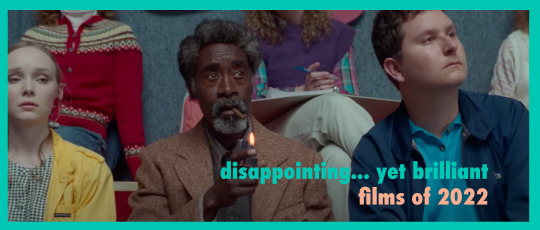
These are my favourite films released in the UK in 2022 – as far as I can tell (it’s getting increasingly hard to work out what snuck out when. Taken as a whole, the list looks a bit Nordic, a bit gloomy, short on action. I’ve put together a round-up of some of the other movies I saw this year, including the critics’ favourite and at least one notorious turkey. And, as ever, there was a lot I didn’t see, because I didn’t get around to it or because I didn’t want to. Specifically, I should mention Top Gun: Maverick, which by most accounts is an excellent piece of film-making – but going to watch a sequel to a film I found excruciatingly dull and full of unappealing characters seemed kind of perverse. And The Banshees of Inisherin: Three Billboards Outside Ebbing, Missouri is unforgivable racist trash, I didn’t like In Bruges (or his brother’s film Calvary for that matter), so I’m not willing to give Camberwell’s Martin McDonagh another chance.
Anyway, on to the list (and do let me know what you think I might have enjoyed but missed).

1. Licorice Pizza
Paul Thomas Anderson in fun mode, telling the story of an entrepreneurial teen in early 1970s LA. It’s beautifully specific, and rather than making cheap and obvious jokes based on stereotypes of the era, it builds punchlines from history. Contains (words I never anticipated writing) a cameo from Bradley Cooper that’s just gobsmacking.
Full review here

2. Hytti nro 6 (Compartment No6)
This is a Finnish train movie set in super-bleak post-Soviet Russia. So yes, you will feel cold and uncomfortable just watching it. Our mismatched travellers are a Finnish mature student exiting a relationship with a Moscow-based academic and a young Russian miner. The question, of course, is how these two will find common ground, but this film – with moments of sharp humour and excellent observation – avoids the obvious and earns your time and patience.
Full review here

3. Verdens Verste Menneske (The Worst Person In The World)
I remain baffled by the title, which does come from a line in the film, but sets off all sorts of false expectations. The central character is no monster (nor, despite what one of the other leads tells her, a particular good person), just a typical contemporary female lead, struggling to find something fulfilling to do as her twenties and early thirties drift past her while dealing with the inadequacy of men, whether as relatives or partners. This is told in 14 sharply written chapters. In particular, the one in which two strangers at a party play at testing what they can do without technically cheating on their partners is great film-making. One quibble and a question: the film sympathises a bit too much with the I’m-just-saying-it-as-I-see-it comix writer dude, and can a bookshop assistant and a barista really afford a flat like that in central Oslo?
(MUBI)

4. White Noise
Middle-aged angst, teen angst, fear-of-the-apocalypse angst, married angst, it’s-the’80s angst, American consumer angst, academic rivalry angst… all these angsts and more are explored in Noah Baumbach’s dark comedy, adapted from a novel by Don DeLillo. Adam Driver and Greta Gerwig play the couple who know that in many ways they should be happy, but of course that just amplifies their misery. Baumbach does a fine job of recreating the 1980s and manages several switches in scale that could have easily tipped the film off balance. Make sure you stay for the closing credit sequence, which is great although it does make hard to actually read who the key grip or the catering company were.
(Netflix)
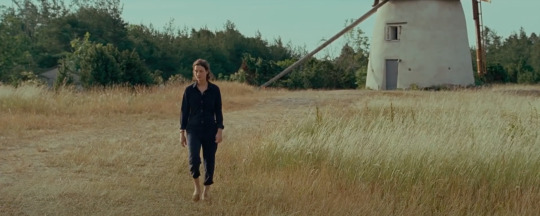
5. Bergman Island
A filmmaking couple go to Ingmar Bergman’s old stomping ground to get some writing done. All does not go smoothly. Much less heavy-going than that makes it sound, and at least as reminiscent of Richard Linklater’s Before trilogy as it is of Bergman. I found it captivating.
Full review here
(MUBI)
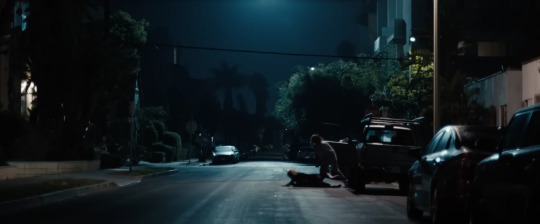
6. Emily The Criminal
Pleasingly spare, low-budget gig economy and scam economy LA thriller that makes superior use of Audrey Plaza's particular screen presence and vibe. Firmly recommended.
Full review here
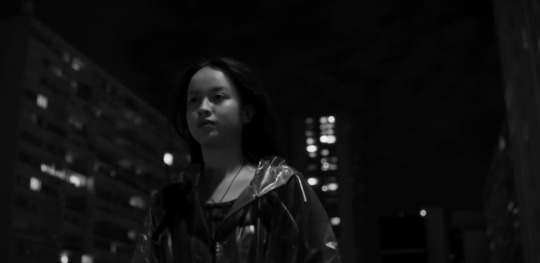
7. Les Olympiades, Paris 13e (Paris 13th District)
Shot in very lovely black & white, this is essentially a sweet comedy-drama about the romantic misadventures of a trio of young(ish) Parisians, although it was marketed as something a bit edgier than it really is. Director Jacques Audiard is best known for male-centric crime movies, but maybe the co-writing credit for Céline Sciamma (Portrait Of A Lady On Fire, Petite Maman) gives a better steer on what this is like.
(MUBI)
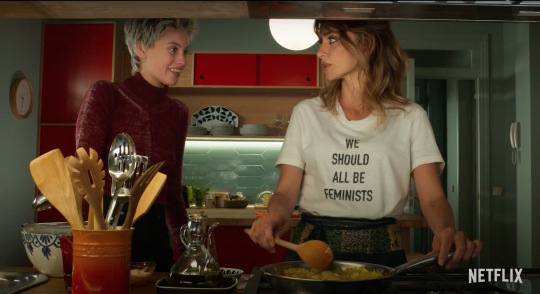
8. Madres Paralelas
I’ve been mostly underwhelmed by Almodóvar’s recent run of what could be called anti-melodramas: stories of wild coincidences and personal tragedies told in numb, mostly humour-free fashion. Madres Paralelas worked better for me: he makes an odd choice of framing the central narrative with a very different one involving the same characters. It’s jarring, but I think it ultimately makes its own kind of sense.
Full review here


9/10. Bodies Bodies Bodies/Triangle Of Sadness
I wasn’t expecting to be repeatedly reminded in 2022 of Very Bad Things, a (not very good) 1998 comedy starring Christian Slater and Cameron Diaz that’s like The Hangover only with a high body count. These films are both vastly superior to VBT, but echo its rapidly escalating nastiness. Both involve the privileged classes placed in situations of extreme discomfort, although the politics of Triangle Of Sadness are more explicit and (it feels) more central to the film than those of Bodies Bodies Bodies.
In BBB, a bunch of twentysomethings gather in big, isolated house just as a storm is approaching. They start playing bodies bodies bodies (known in my time as murder in the dark), only… well, you can guess. There’s a strong 1990s vibe to this, especially the way the movie seems to feel about its characters, while being very 2020s in its casting, the sex lives of the characters and the woman worried her podcast (‘a podcast takes a lot of work!’) isn’t getting any respect from her friends. I really enjoyed this.
If you have seen Ruben Østlund’s Force Majeure or The Square, you’ll know to expect fairly broad satire and the lives of the pampered going very wrong in Triangle Of Sadness. (If you haven’t seen any of them, start with Force Majeure, which is the best of the trio.) TOS ups the stakes on Force Majeure’s ski resort by putting its characters on a luxury yacht. There’s a deceptively low-key beginning in which we’re introduced to Yaya (the late Charlbi Dean) and Carl (Harris Dickinson), models in a relationship driven - at least for her - by the potential for Instagram influencer synergy. The intensity builds when they bag a free holiday on the yacht, where Østlund attempts to outdo The Square’s much-discussed party scene. At which point, it’s fair to say that as much as Jean Luc Godard’s Week End and assorted Buñuel films, this is indebted to American gross-out movies. Subtle this film is not, but if you have a strong stomach and a taste for comedy that’s grotesque and openly political, this is a blast.

11. Competencia Oficial (Official Competition)
Take the title of the movie itself plus that of the film-within-the-film – Rivalry – and you’ve got the theme of this Spanish comedy. An aging billionaire decides to fund a potentially prize-winning film in an attempt to cement his legacy. He’s advised to hire the talented-but-eccentric Lola (Penelope Cruz) to direct and she casts a very serious theatrical type (Oscar Martinez) and a mainstream movie star who has houses in LA and St Tropez (Antonio Banderas). The two actors, inevitably, clash over their contrasting lifestyles and approaches to their craft, with Lola’s interventions pushing up the tension. The film is essentially a three-hander, as the trio rehearse the film in the vast, empty, marble spaces of the rich dude’s foundation.
It stays more on the leash than I was expecting – there are multiple opportunities for things to get unhinged that the film doesn’t take (or mostly). I did properly laugh a fair number of times, and with Almodóvar seemingly sworn off comedies for good, this does a decent job of filling that void.
9 notes
·
View notes
Text

Jane Kaufman was making minimalist paintings in the early 1970s, spraying automobile paint on huge canvases. To be sure, the paint was sparkly, so the canvases shimmered — “lyrical abstraction” was how one reviewer described her art and that of others doing similar work — but they were firmly of their reductive minimalist moment. Hilton Kramer of The New York Times approved, giving Ms. Kaufman a nod as a “new abstractionist” in his mostly dismissive review of the Whitney Biennial in 1973.
Then Ms. Kaufman made a sharp turn.
She began stitching and gluing her work, using decorative materials like bugle beads, metallic thread and feathers, and employing the embroidery and sewing skills she had been taught by her Russian grandmother. By the end of the decade, she was making first luminescent screens and wall hangings, then intricate quilts based on traditional American patterns.

In celebrating the so-called women’s work of sewing and crafting, she was performing a radical act, thumbing her nose at the dominant art movement of the era.
Ms. Kaufman died on June 2 at her home in Andes, N.Y. She was 83. Her death was confirmed by Abby Robinson, a friend.
Ms. Kaufman was not alone in her focus on the decorative. Artists like Joyce Kozloff and Miriam Schapiro were inspired, as she was, by patterns and motifs found in North African mosaics, Persian textiles and Japanese kimonos, as well as by homegrown domestic crafts like quilting and embroidery. It was feminist art, though not all its practitioners were women. (One of the more prominent ones, Tony Robbin, is a man.)
The movement came to be known as Pattern and Decoration. Ms. Kaufman curated its first group show in 1976, at the Alessandra Gallery on Broome Street in Lower Manhattan, and called it “Ten Approaches to the Decorative” (there were 10 artists). For the exhibition, she contributed small paintings she hung in pairs, densely striped with sparkly bugle beads.
“The paintings are small because they are not walls, they are for walls,” Ms. Kaufman wrote in her artist’s statement.
Other galleries, like Holly Solomon in New York, began showing the Pattern and Decoration artists’ work, and it also took off in Europe before falling out of favor in the mid-1980s. Decades later, curators would scoop up artists like Ms. Kaufman in a series of retrospectives, starting in 2008 at the Hudson River Museum in Yonkers, N.Y.
“It’s funky, funny, fussy, perverse, obsessive, riotous, accumulative, awkward, hypnotic,” Holland Cotter wrote in his review of that show in The Times. The Pattern and Decoration movement, he wrote, was the last genuine art movement of the 20th century, with “weight enough to bring down the great Western Minimalist wall for a while and bring the rest of the world in.”

Ms. Kaufman was born on May 26, 1938, in New York City. Her father, Herbert Kaufman, was an advertising executive with his own firm; her mother, Roslyn, was a homemaker. She earned a B.S. in art education from New York University in 1960 and an M.F.A. from Hunter College. She taught at Bard College in Annandale-on-Hudson, N.Y., in 1972, one its first female professors. “She was famous for telling her female students, ‘You are all brilliant and you are all going to end up at the Met,’” said the arts writer Elizabeth Hess, a Bard graduate.
From 1983 to 1991, Ms. Kaufman was an adjunct instructor at the Cooper Union in New York. Her work is in the permanent collections of the Whitney Museum, the Museum of Modern Art and the Smithsonian Institution. She was a Guggenheim fellow in 1974 and in 1989 received a grant from the National Endowment for the Arts. Her “Crystal Hanging,” a glittering sculpture that looks like a meteor shower, is in the Thomas P. O’Neill Federal Building in Boston.
In 1966 she married Doug Ohlson, an abstract painter. The marriage ended in divorce in the early 1970s.
No immediate family members survive.
While Ms. Kaufman was extremely serious about her work, she was also a prankster dedicated to political activism; for decades, a pink penis poster she created was featured at marches for abortion rights and other women’s issues. Its last outing was at the Women’s March in New York City in January 2017.

She was a member of the Guerrilla Girls, the art-world agitators, all women, who protested the dearth of female and minority artists in galleries and museums by papering Manhattan buildings in the dead of night with impish posters like “The Guerrilla Girls’ Code of Ethics for Art Museums,” which proclaimed, “Thou shalt provide lavish funerals for Women and Artists of Color who thou planeth to exhibit only after their Death” and “Thou shalt keep Curatorial Salaries so low that Curators must be Independently Wealthy, or willing to engage in Insider Trading.”
Membership was by invitation only, and most members’ names were a secret (they wore gorilla masks in public). Many Guerrilla Girls used the names of dead female artists, like Käthe Kollwitz and Frida Kahlo. But Ms. Kaufman did not.
“Jane had a wicked sense of humor, the ability to get right to the center of an issue and the courage and principles to confront the powers that be,” the Guerrilla Girl who calls herself Frida Kahlo said in a statement. “We will never forget her. We hope that Jane is also remembered as a wonderful artist who tirelessly worked to break down the conventions of ‘craft vs fine art’ and later combined her meticulous handwork with biting political content.”
Ms. Kaufman’s later work, Ms. Hess said, was as political as her decorative work had been, and dealt with religious and social divisions. But she was unable to find a gallery that would show it. An embroidered piece from 2010 announced, in metallic thread on cutwork velvet, “Abstinence Makes the Church Grow Fondlers.”
“She was an artist who floated under the radar,” Ms. Hess said. “She was underacknowledged, though she had curated the first Pattern and Decoration show. Her work came out of her interest in women’s labor, but I think the real revelation to me about Jane’s work was its sumptuousness and beauty.”

In late 2019, a retrospective called “With Pleasure: Pattern and Decoration in American Art 1972 to 1985” opened at the Museum of Contemporary Art in Los Angeles (it is now at Bard through Nov. 28). Anna Katz, the show’s curator, chose a multicolored velvet quilt by Ms. Kaufman for the exhibition. Inspired by traditional crazy-quilt patterns, Ms. Kaufman had used over 100 traditional stitches, some dating back to the 16th century, in the piece, which she finished in 1985.
#Rest in Power Jane Kaufman#Women in the art world#Textiles and art#Pattern and Decoration#Guerrilla Girls
117 notes
·
View notes
Text
"The Vampiric Woman and Her Lady," First Chapter
Greetings,
In the coming year, I will set upon writing a thesis on female representation in vampire literature. I have already completed a first draft of the chapter in which I discuss J.S. LeFanu's "Carmilla" and thought I should share it here. Apologies for any formatting errors, I am slowly relearning how to use Tumblr.
The Vampiric Woman and Her Lady
Carmilla and Laura in LeFanu’s “Carmilla”
Carmilla and Laura each represent opposing paradigms of femininity with Carmilla’s brand being active while Laura’s is passive; however, rather than punishing Carmilla for her transgressions against Victorian ideals of femininity and rewarding Laura for upholding them, the story punishes both women simply for existing as females. Carmilla’s agency poses as much of a threat to Victorian society as Laura’s innocence and passivity.
Carmilla
J.S. LeFanu’s Carmilla uses the titular character Carmilla to express concerns regarding women and their position in society. Carmilla’s perversion of motherhood, her status as non-English, and the ways she wields her femininity and sexuality are a product of her agency. Her agency threatens Victorian society because it contradicts the societal ideal of passive femininity devoid of desire; however, despite her villainy, Carmilla’s agency makes her a compelling figure for modern female readers because of the control she has over her body and her life.
The way Carmilla undermines motherhood plays on Victorian fears of bad mothers abusing their power while exploring a sexual relationship in which a woman holds the power to dominate her partner. When Laura first encounters Carmilla, Carmilla appears as a maternal figure shortly after the death of Laura’s real mother. LeFanu writes, “She caressed me with her hands, and lay down beside me on the bed, and drew me towards her, smiling; I felt immediately delightfully soothed, and fell asleep again” (LeFanu, 277). Carmilla’s position as a pseudo-mother to young Laura means that she possesses power over Laura. When Carmilla bites Laura’s “breast” in order to feed on her, she takes advantage of the power given to her and uses it selfishly (LeFanu, 277). This act of selfish abuse of power stokes Victorian fears of women taking the power given to them and using it for themselves as opposed to their families. Additionally, because Carmilla feeds from Laura’s breast, she reverses the image of the mother breastfeeding the child thereby turning a wholesome image into one that is perversely sexual. Motherhood is a place of ultimate power over another individual, and so sexualizing that power exemplifies the fear of female sexual power and authority.
In addition to bad motherhood, the initial scene between Laura and Carmilla explores themes of female sexual awakening which bolsters the Victorian sentiment that female sexuality is inherently perverted. When Laura—now nineteen—and Carmilla meet formally for the first time and discuss the “dream” they shared, Carmilla says, “I was aroused by a scream; you were sitting up screaming” (LeFanu, 288). Laura’s screams roused Carmilla from her slumber, but, as William Veeder points out in his article Carmilla: The Arts of Repression, “the surface meaning of being awakened by Laura's cry carries also the suggestion that suffering, particularly female suffering, arouses Carmilla sexually” (201). For a woman to say “I am into Y sexually” is still fairly taboo, but it was all the more so in the Victorian era.
Carmilla wields her feminine appearance with intent and takes advantage of the virtues others project onto her because of her appearance. Her awareness of how to use her femininity to advance her goals is hugely threatening to Victorian society which relies on women remaining powerless. At the beginning of the story, Laura is expecting a visit from General Spielsdorf and his daughter, Bertha; however, Laura’s father informs her that he’s received a letter from the General detailing Bertha’s death. We later learn that Carmilla was responsible and that the General knew this when he wrote the letter. He writes of Carmilla, “I thought I was receiving into my house innocence, gaiety, a charming companion for my lost Bertha” (LeFanu, 280). The General cannot fathom a woman as anything deeper than her appearance, and Carmilla uses that to gain access to Bertha. Her ability to squeeze power, however malicious, from her feminine appearance was radically terrifying considering Victorian women were meant to be “pure” and ignorant of their own beauty.
However, Carmilla’s ability to deceive others lies not only in her appearance but also in her performance of femininity. The General regales of meeting Carmilla and her mother at a masquerade ball. As if it were not enough that Carmilla is deceitful, she also makes her victims like her thus preying further on others’ treatment of women. The General goes on to say, “Millarca became very intimate with us… I liked her nature more and more every minute” (LeFanu, 325). Not only does Carmilla use the General’s conception of femininity against him, but she charms him into actually liking her. Her manipulation of the General demonstrates the invisible threat women pose. In a society that views women as fragile and incapable of evil, any woman can subvert that view and use it to her advantage.
Carmilla’s unmarked appearance subverts the notion that evil can be plainly observed and thus avoided, which plays into the not-uniquely-Victorian fear of being endangered without knowing it. She is repeatedly described as various degrees of “beautiful” by Laura which subverts the fairy-tale notion of evil being present in the form of some physical mark or ugliness (LeFanu, 290). This suggests a failure of not only conventional knowledge but also of superstition to warn Carmilla’s victims of her true nature before it is too late. Even the General says Carmilla is “very pretty,” but in his next sentence refers to her as a “fiend” implying that her exterior beauty disguises her nature (LeFanu, 280). The form she takes while feeding on her victims is that of “a sooty black animal that resemble[s] a monstrous cat” (LeFanu, 304). When he meets Carmilla at a masquerade ball, he says “She wore no mask” perhaps because the body she inhabits—that of a beautiful young woman—is itself a mask (LeFanu, 319). On the surface, the is nothing suspicious about Carmilla which is why she is such a threat: her femininity disguises her monstrosity.
Carmilla also weaponizes traditional aspects of Victorian femininity to disguise her physical strength, which emphasizes the threat of unknown evils. The feminine disguise Carmilla dons extends to the way she carries herself, which Laura describes as “languid” (LeFanu, 290). She plays up her adherence to Victorian feminine ideals that women should be “tubercular” and waifish. She disguises her strength by appearing to be exhausted by even the simplest of actions, which makes her vampiric strength all the more threatening—because it is thoroughly unexpected. Later, when the General attempts to apprehend Carmilla, she grabs ahold of his wrist. He does not expect Carmilla to be capable of physically besting him and when “The slender hand of [Carmilla] closed like a vice of steel on the General’s wrist…”, he is shocked (LeFanu, 339). The paradox that her hand is both “slender” and “like a vice of steel” exemplifies how much more threatening the unexpected and unknown are. It is one thing to know one should be afraid, but it is infinitely more dangerous to be in the presence of a monster and not even know it. Carmilla wields her sexuality with similar self-awareness.
The autonomy with which Carmilla wields her sexuality threatens the heteronormative status-quo in which women are forbidden to be sexual and, because much of her power is derived from her sexuality, she exemplifies how much damage a sexually empowered woman can do to her society. Carmilla’s sexual power terrifies Victorian sensibilities which reject all notions of female sexuality. In his article Carmilla: The Arts of Repression, William Veeder writes, “Social theorists as well as novelists realized that orthodox attitudes toward sexual purity had caused a dangerous split between conscious and unconscious” (198). The Victorian model of sexuality taught women to consciously deny their sexual desires, but failed to eliminate them on the unconscious level thus creating the “dangerous split” Veeder refers to between the conscious and the unconscious. Because Carmilla is aware of her sexuality and pursues her desires actively, she resolves this tension created by the Victorians. Carmilla herself says “... love is always selfish; the more ardent, the more selfish” (LeFanu, 302). Carmilla is not ashamed of her “selfish” pleasure-seeking and, in fact, she asserts that love has always been in some ways a “selfish” act; the more pleasurable and passionate, the more selfish it is. The idea that a woman can be selfish in love and sex is taboo even today, but Carmilla has exemplified it since the Victorian era. One cannot be a selfish lover without first being sexually empowered and, despite her villainy, Carmilla’s selfishness is somewhat feminist.
Perhaps the most plainly transgressive characteristic of Carmilla is her explicit and undeniable lesbianism, which she uses to ensnare her victims; however, the fact that Carmilla is so reliably able to capture the attention and affections of young girls indicates a cultural paranoia that within all women, a dormant lesbian lies in wait. Laura describes her first romantic encounter with Carmilla saying, “It was like the ardour of a lover… and with gloating eyes she drew me near to her, and her hot lips travelled along my cheek in kisses…” (LeFanu, 292). The words Laura uses to set the scene are erotic and reflect the confident intention behind Carmilla’s actions. Carmilla’s eyes do not just gaze passively, they “gloat” at the accomplishment of her goal. Likewise, Carmilla is the one doing drawing Laura in and kissing her. Additionally, Laura does not shy away from feminizing Carmilla during their sexual encounter as Laura repeats the words “she” and “her” thus admitting to committing an act of queerness. However, after her encounter with Carmilla, Laura remarks, “What if a boyish lover had found his way into the house, and sought to prosecute his suit in masquerade…” (293). Laura attempts to deny that she participated in a sexual encounter without a man’s involvement and that she enjoyed such an act. Laura, as a good English girl, cannot possibly be queer, because to be queer means that she cannot also be good. Herein lies the panic Carmilla’s lesbianism awakens. She draws queerness out of her victims. Just as Carmilla entraps her victims by making them aware of their queerness, the queer female reader is entrapped by her sexual enjoyment of the story.
The fact that a self-assured, sexually empowered woman who derived her identity from a source outside of motherhood was so terrifying that it warranted a monster to embody those fears lead to the creation of a character who would go on to define an entire genre of lesbian media is satisfyingly ironic. Carmilla embodies Victorian fears about what women are capable of when given agency of their reproduction, sexuality, and performance of their femininity. The things she does are monstrous because she is a woman doing them and not because she is a vampire. LeFanu uses Carmilla’s vampirism as a symbol of deviant femininity.
Laura
Although the narrative depicts Carmilla’s agency as monstrous, it is not much kinder to Laura’s stagnance. Laura, as the point of view character, lacks knowledge of herself which Carmilla takes advantage of. Before Carmilla’s arrival, she is said to be bored and lonely. Throughout the story, her father and the General consistently fail to protect her and, being a woman, Laura is incapable of protecting herself. Where Carmilla represents the threats of active femininity, Laura represents the dangers inherent to passive femininity.
Laura’s loneliness allows Carmilla to corrupt her, thus the narrative warns of the dangers inherent to feminine idleness. LeFanu introduces the reader to Laura by emphasizing how lonely she is by having her say, “I have said that this is a very lonely place… The nearest inhabited village is about seven of your English miles to the left” (LeFanu, 275). The emphasis placed on her physical isolation sets up a relationship between her loneliness and the events of the story. Upon learning of the delay facing the General and Bertha, Laura says, “I was more disappointed than a young lady living in a town, or a bustling neighbourhood can possibly imagine” (LeFanu, 279). Laura places herself in contrast with those who live around others which emphasizes how special an occasion receiving company is for her. Her physical isolation produces social isolation which makes Bertha’s delay, and eventual death, all the more dispiriting for Laura. So, when Laura sees Carmilla at the scene of the carriage crash, she immediately asks her father to invite Carmilla to stay with them saying, “Oh! Papa pray ask her to stay with us – it would be so delightful” (LeFanu, 283). Laura sees a friend in Carmilla, something which she so desperately wants. Laura’s loneliness grants Carmilla access to another victim.
In addition to her loneliness, Laura lacks knowledge of herself, creating a void for Carmilla to fill, thus her docile brand of Victorian femininity is what allows the monster in. Laura does not get a name until page 312 which creates a vacuum where Laura’s self-identity should be (Veeder, 199). Laura is empty, so when she encounters a being like Carmilla who wishes to fill Laura’s emptiness with herself, Laura stands no chance against Carmilla. Carmilla tells her, “You are mine, you shall be mine, and you and I are one forever” and Laura is left “trembling” (LeFanu, 192). She replies, “I do not know myself when you look so and talk so” (LeFanu, 192). Laura has no means by which to resist Carmilla’s invasion because she does not have a sense of self to brace against Carmilla. After Laura is bitten and becomes ill she says, “Dim thoughts of death began to open, and an idea that I was slowly sinking took gentle, and, somehow, not unwelcome possession of me” (LeFanu, 307). At this point, Carmilla’s vampirism has quite literally infected Laura and slowly consumes her. Laura’s admission that her sinking is “not unwelcome” indicates that she has surrendered herself to Carmilla. Additionally, her ideas take “possession” over her which echos her lack of agency as she does not even control her own thoughts, rather, they control her. Despite her performance of the compliant brand of Victorian femininity, which contrasts sharply with Carmilla, Laura still receives blame for the events of the narrative.
Laura’s father constantly fails to inform her of her dangerous situation which emphasizes women’s infant-like dependency on men to protect them. Laura’s father keeps news of Bertha’s death from her saying, “I quite forgotten I had not told you,” which indicates that his failure to communicate arose from his sheer incompetence (LeFanu, 279). However, when Laura is sick and dying of a vampire bite, he outright refuses to answer her questions regarding her own diagnosis saying, “[there is] Nothing [wrong]; you must not plague me with questions… you are not to trouble your head about it” (LeFanu, 315). In this instance, his failure to communicate is rooted in his desire to keep Laura in a state of blissful ignorance. He does this knowing that when the General did the very same to Bertha, she died (LeFanu, 280). Additionally, his characterization of Laura’s questions as “plague[ing]” him is a condemnation of Laura’s attempt to understand her own body (LeFanu, 315). If her father had told her that the doctor believed Laura had been bitten by a vampire, he could have provided her with the information she needed to catch Carmilla out and put a stop to her schemes earlier. But, because of his gross incompetence, he fails to do so. His failure embodies the fear that without competent men around them at all times, women will be helpless against any and all threats because they are naturally incapable of fending for themselves.
Both Laura’s father and the General are emasculated by their failure to protect Laura which genders their incompetence as feminine and forces Laura to assume the role of protector. Laura describes her father as an “invalid” and explains that she does not want to tell him about her encounter with Carmilla because she “was afraid of alarming him,” which links his physical state to his incompetence in protecting his daughter (LeFanu, 305). Additionally, in having to take her father’s invalidism into account, Laura is put in the position of protector which reverses the Victorian standard of women as fragile and men having to accommodate them. The consequences of her failure as a protector emphasize her natural unsuitedness to the role because of her gender. The General also fails twice to protect his charge and slay Carmilla: once as she preys on Bertha and once as she preys on Laura (LeFanu, 332). Veeder writes of this failure, “The male agent is only an onlooker, cut off from his manly sword, circumscribed by the vaginal crevice, impotent before the phallically swelling vampire” (205). The General’s failure to perform his protective duties not only emasculates him but also emphasizes Carmilla’s ability to take on a masculine role despite being a woman. In this schema, the General, like Laura’s father, becomes an invalid and his incompetence is feminized.
Despite performing her femininity to a Victorian standard, Laura receives blame for her circumstances. This highlights that, as fearful as Victorians were of female agency, they were just as afraid of female passivity. Laura’s femininity is dangerous because it makes her the weakest link in her social chain and forces others to bear the responsibility for her safety.
Conclusion
While Carmilla and Laura have diametrically opposing versions of femininity, the narrative punishes both of them simultaneously for existing as women. Carmilla’s deviancy matters less than her female status and Laura’s innocence matters less than hers. Carmilla is a story about the threats womanhood poses to the woman herself and those around her.
Works Cited
LeFanu, Joseph S. “Carmilla.” Best Ghost Stories of J.S. LeFanu, edited by E F Bleiler, Dover, New York, NY, 1964, pp. 274–339.
Veeder, William. “Carmilla: The Arts of Repression.” Texas Studies in Literature and Language , vol. 22, no. 2, 1980, pp. 197–223. JSTOR, https://doi.org/0040-4691/80/020197-27$02.15. Accessed 28 Mar. 2022.
#vampire#carmilla#gothic#gothic literature#le fanu#victorian gothic#irish gothic#vampire literature#vampire scholar#vampire studies#women's studies#lesbian vampires#victorian lesbians#lgbt literary history
8 notes
·
View notes
Text
JELLYFISH OR MEDUSA?
I start from this meta of @sagestreet (X), but since I completely move away from his topic I quickly put my ideas here ... hey soon it's Christmas, who really has time to think about jellyfish?
However, when I think of the jellyfish in Sherlock, despite the visual stimulus (aquarium) and the suggestions (THOB), I can't help but think of Medusa in the first place.
Now who was this creature? She was a Gorgon, terrible creatures that petrified men at the mere glance. She was not alone but she had two sisters and they were daughters of Forco, who represented the dangers hidden in the depths of the sea. I would emphasize the concept of depth and sea / water. The dangers inherent in the depth of emotions, Sherrinford is also under the sea, one could easily think that it is about the depths of the human psyche.
And what are these monsters, these dangers, which are hidden so deeply? They are sexual perversion (Euryale), moral perversion (Steno) and intellectual perversion (Medusa).
And what was experienced as perverse in all respects, moral, sexual and intellectual, in the Victorian era? yes, homosexuality.
John and Sherlock tell us that a jellyfish/Medusa cannot be stopped and in the presence of jellyfish, this time, no one is petrified, instead the heteronormativity is killed.
A rebellion against the preconstituted, and it is not the first time that Medusa is used as a symbol of change, she was a symbol during the French Revolution, and Shelley dedicated a poem to her attacking the patriarchy that had made Medusa victim, monster and victim again. In fact, the myth tells that before she was a monster she was a beautiful girl that Poseidon fell in love with. He ended up raping her, unleashing Athena's anger who, instead of taking revenge on him, Poseidon, transformed the girl into a monster that Perseus ended up killing. Medusa therefore also became a symbol of the feminist movement of the 70s. A woman transformed into a monster by men who could not tolerate her being seductive. And the Moffits explicitly used feminism and the feminine as an allegory for homosexuality, just look at the multiple female mirrors, Eurus and the League of Furies. Homosexuality transformed into monstrous because it is scary. But at the end of Medusa's severed-headed story, Pegasus (practically a My Little Pony) and a giant with a .... long golden sword were born.
@possiblyimbiassed @gosherlocked @ebaeschnbliah @sagestreet @sarahthecoat
29 notes
·
View notes